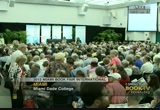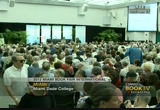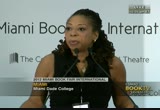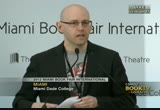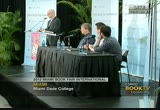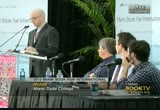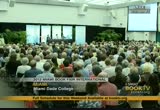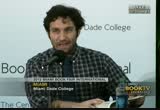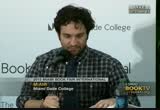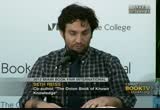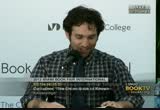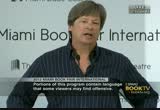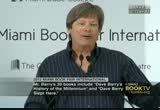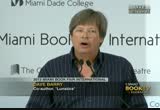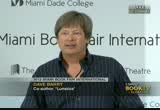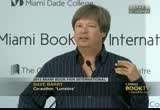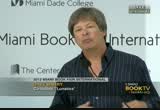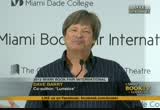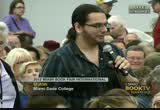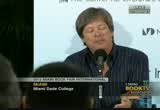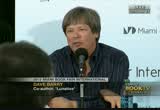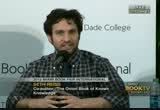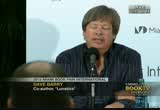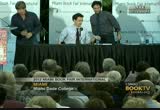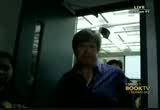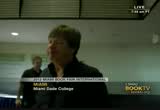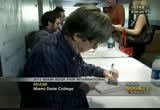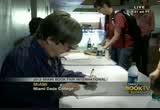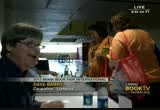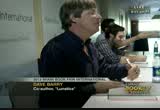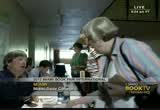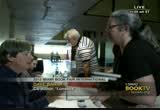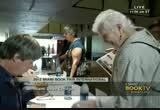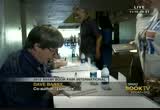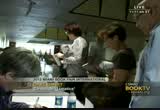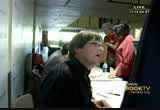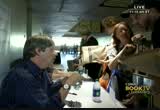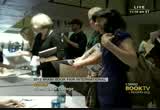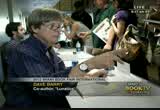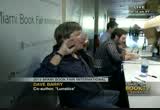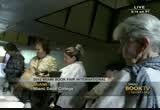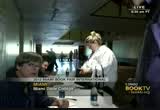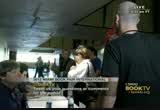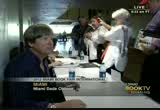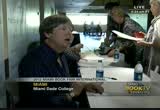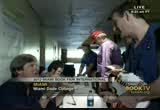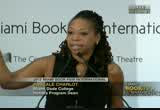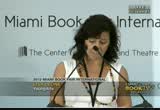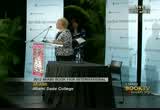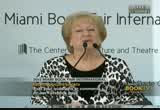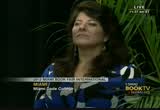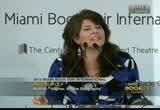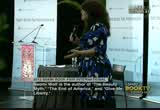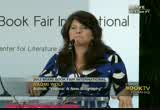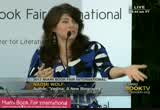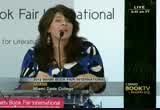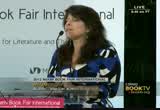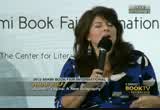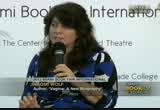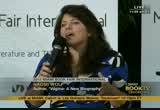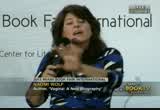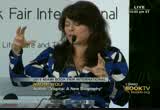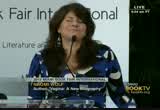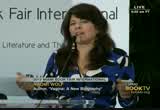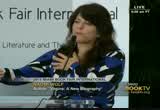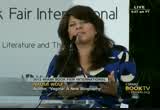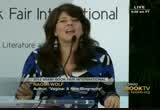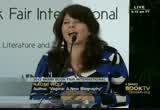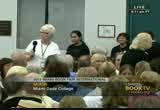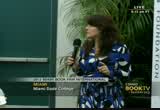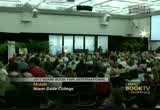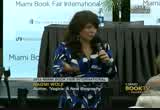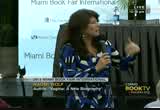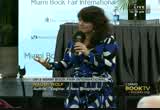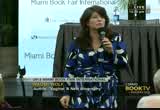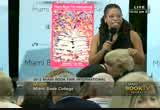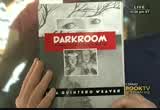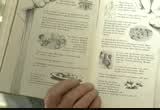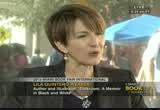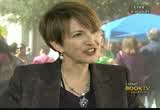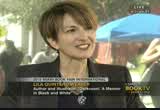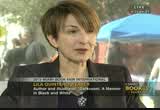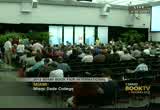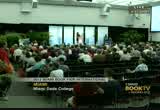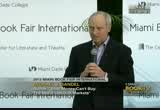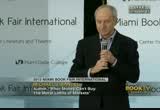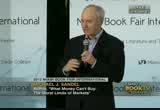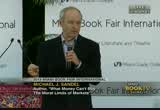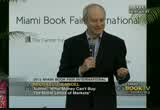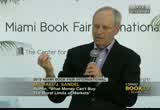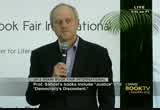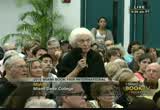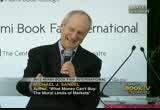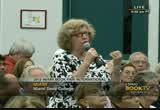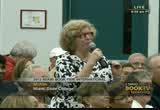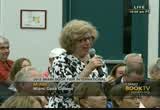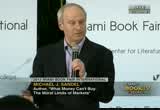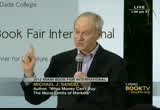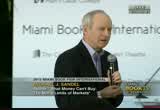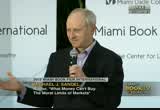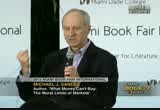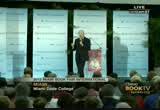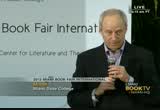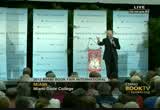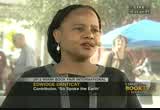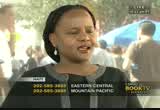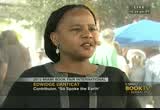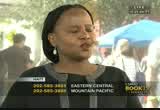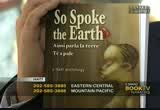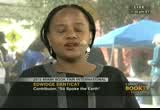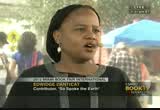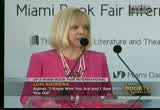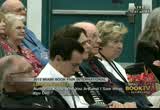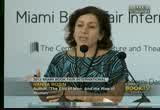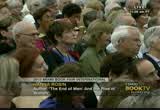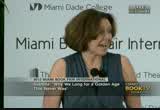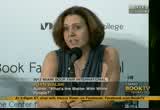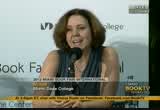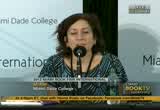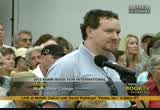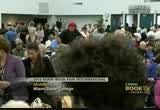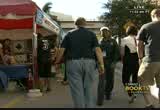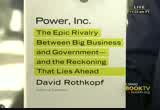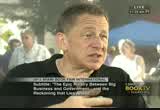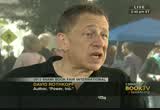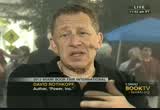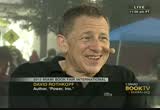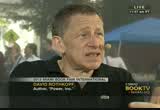tv Book TV CSPAN November 17, 2012 10:00am-3:00pm EST
10:00 am
10:01 am
we had down here this weekend. we will be live all week. about hundred thousand people attend this event every year as well as about 350 authors are down here. was founded by mr. kaplan, founder of books and books as well. the big bookstore down here in south florida. well, the c-span buses also year, and we are handing out but banks with our partners comcast here in the miami area. if you happen to be in the area, come on down. we are at miami-dade college the north side of downtown miami for the miami book fair. in just a minute the panel in chapman all here at miami-dade college will begin -- will be beginning. dave barry in the onion editors,
10:02 am
humor columnist solve them. there will be introduced by brad meltzer who will be moderating the panel. the novelist will be joining us later. ms. kaplan will also be speaking, the founder of the miami book fair, introducing and opening the weekend coverage. in just a minute we'll take you now to chapman all. it's rather full. we will be beginning or coverage varies and. we are live on book tv. [inaudible conversations] [inaudible conversations]
10:04 am
10:05 am
>> good morning. i had a little bit too much coffee is morning. it is a pleasure to see you. we are delighted to welcome you to the first session this saturday morning. how are you today. [applause] as you know, this is one of the most exciting times for us in the fall season in miami, and we are thrilled with this morning's panel. first and foremost, we would like to thank everyone who helped make this impossible, including our sponsors as well as blue florida and our
10:06 am
volunteers. before we get started now would like to ask everyone to please turn off your cell phone, beavers, anything that could generate noise that is not from the human body. take a moment to take care of that. yes. turn those off, too. and that like to take a moment to introduce our host today which is brad meltzer. you know him from the tv host of decoded on the history channel and number one best-selling author of the inner circle. please join me in introducing our host, brad melson. [applause] >> i'm going to make this very easy. let me call these guys out so they can be on stage. let's give them some applause first. [applause] i actually got them in order.
10:07 am
and when i got asked to introduce them i got very excited pivoted dave is one of my literary heroes. i grew up here in miami. it was the first author i ever went to a book signing for. i don't care about anyone but myself, let's be clear. the first author i ever wrote a letter to and the first author ever wrote back. i was so excited to come here that i actually tracked down all other the he wrote to me and brought it. i'm going to read it to you. it said tear bread, one day you will be a best-selling author. when that happens i will be sold because i am all the new. i will always be old and new. even when you grow baldy on sale will die first.
10:08 am
i'm old, and old people die, especially in miami. i hate you, you young handsome brick. sincerely yours, dave. everyone knows best true. that's a real letter. everyone knows that they've won the pulitzer and nobel peace prize. the onion guys are like a man as i get joke. that's a killer joke. apparently he has a new book called led tech's with chico wrote simply so he only had to do have to work. what i admire most about davis's ability come here without his co-author. it takes a real callus bastard to show up and drink all the glory from military punchball. the same can't be said of sentries when i looked up seth
10:09 am
and will on the internet it said almost nothing about them. which is saying something. set to grow obituaries. the editor of the end is actually the head writer. the first thing that he does in the morning is check twitter. is that all your life have to honor -- has to offer? with a name like dick tracy and don't trust the man. so i look at their books, and these are from my shelf. these of the first books of the onion ever put out. just greatest hits books. this of regurgitated. answer me that puts me in a keg are with alums like bruce willis
10:10 am
masters series. holland of its greatest hits. let's begin, greatest hits albums have no soul. no lazar form of entertainment. makes it the literary equivalent of another line of elton john allen. why write something new? thank you for the effort. i can't wait until you put it back in theaters next year, and it's the same. a poll this book for my shelf. so the truth this, all kidding aside, the book is not a greatest hits book. it was just a joke to one of the tell. their rig this amazing encyclopedia with amazing injuries kind you really should read it. the city of this that i am on my shelf. this is truly the first
10:11 am
hardcover book i ever bought. it's as much love as i can show anything. there is knowing in without dave barry. pat quinn of -- no one made fun of kraft earlier. with that said, without further ado. [applause] >> thank you so much. the onion would never write him back. folks cannot my name is will tracy. this is our new book. 183rd imperial addition. encyclopedia of all the world's knowledge, anything in the world that exists is in this book. anything that is not in the book
10:12 am
does not come in fact, exist. so dave's new book is not in this book so it does not, in fact, exist. >> dave barry is not in the buck. dave barry is a figment of our collective imagination. we will come into existence of the power of the mind theater to read this book is, as i said, an encyclopedia. for those are not familiar with the most powerful organization in the world founded in 1756. oppression farmer heard traded sector hands for printing press and founded the mercantile line in named after the only three words of english that he knew since then we have gone on to become simply dominant. >> you don't have to just sit there. you can chime in any time you want.
10:13 am
>> you may think he was paid to say that. he was. we control everything, television, radio, print. reprint all of davis polk's. reprint essentially every book that has been featured. really the only book the need any more is the kind in book of knowledge. flabbergasted how humanity has been able to get baia the last 200,000 years. stumbling around in a blind a verdes. >> you can chime and what the people want to know? seriously. >> it will be in the book.
10:14 am
if you shout out. just show something out. >> millard fillmore. >> my colleague will cut bill would fall more. it's very simple. the year to the f section. >> every entry in this book cost millions of dollars to compose. each individual injury. thirty-four years to research and miller fell more. thirteenth president of the united states. that the north and south to hold off for 11 years by arguing it would be better for the whole country of the conflict for handled by future president abraham lincoln. >> he knew. >> the last member of the whig party to hold high office, he saw early on the tensions between the rival factions were reaching a breaking point and he freely admitted in speeches that he was not the man to be in charge of the country about to enter a war that would be far
10:15 am
bloodier the moral or one with a reconstruction to follow. tasks that are managed by big-time presence with that club and stature of teddy roosevelt or fdr. his -- he famously said the upcoming civil war was clearly lankans moment to shine and that the thought of himself delivering the gettysburg address or freeing the slaves was as impossible to imagine as seeing float hands across scipio photos of me. [laughter] >> he knew. thank you so much. >> correct me if i'm wrong, but i think that pedagogical redness is something you'll find your of the entire book. >> is there any other president the people want to year about?
10:16 am
judy puente does now exist. anybody else? bill o'reilly. >> we do have is your the blonde entry. american writer whose books give kids a license to beef fat and then straight with impunity. carte blanche. >> bill o'reilly does, in fact, not exist. sorry. [inaudible] >> let's read the entry. >> sure. >> it's a miami thing. >> that terrifies me, what that woman said.
10:17 am
>> miami, large american city of two and a half million people located on florida's southern coast that has been clean and sober going on six weeks now. the center of finance and trade, miami will remain by the grace of god a substance redefinition -- destination for millions of tourists. mammy -- miami has spent every day in a haze of drug and alcohol. the city barely recall saw its most important moments including 1836 construction, incorporation as a city, or the suburban sprawl of the past 50 years which is pretty much just a blur. mamie cleaned up for bid in the late 1980's, but after the sudden appearance of hurricane andrew the city went on a monthlong cocaine bender finally hitting rock bottom with the collapse of 2008 when travois nearly everyone who cared about it. still, miami has a new outlook on life and will take it one day
10:18 am
with the largest population of cubans in the estates of the time. >> dave barry. >> he does not exist. persist with there fantasy if you wish, but you are mentally ill and diluted because that person is a figment of your imagination . >> rating does exist. >> creative process of raws in the internet, tricking -- drinking coffee to madonna for a walk, and masturbating. >> that is what writing is. [indiscernible] >> did i hear that right? >> palin chronic. yes. i see a hand. winston churchill. >> i believe you read that. >> we have a team of researchers they brought it to well. winston churchill, a small
10:19 am
talking man deployed to great britain during the second world war to talk at the british people. the little talking person was. i could put in front of microphones or in the middle of parliament after which you would be placed in storage until another dramatic event happened and he was needed for more talking. the successful deployment is now seen as having been crucial in great britain defeating nazi germany and its own little talking man. i'm also picking of the entry for kitchen. if another room contains more knives did his room kid how that happens >> george w. bush. >> he's in the buck. let me find that esteemed gentleman. is he?
10:20 am
>> he is. >> there he is. forty-third president of the added states who received the presidency as a gift for his 504th birthday from his parents, george and barbara. >> and the state of florida. >> using his connection to the supreme court has fire was able to pull a few strings to give his son the extravagant presents witchy accepted despite his disappointment over not receiving a ford mustang that he had repeatedly requested. although he enjoyed the parade, he grew bored of the oval office , so his buddy take and of orchestra and a military invasion of afghanistan to cheer him up and given something into. he also received a second presidential term as an early christmas present not long after inheriting his father's a war. >> there are some interesting facts about tours of the bush. main a steep -- achievements, eg daylight savings time. biggest regret, never attended a
10:21 am
cabinet meeting, never once. nickname, all fa cup, old massive lock up, called a huge pile, and scored. famous ," i think their is a chance and not during a very good job. other things. >> bailout. how about the economy. how about economy. let's find economy. >> feel free to turn in. >> we're almost done. >> economics, science of
10:22 am
explaining where all the money went. the field of economics is divided into two main categories , microeconomics with examines why stephanie was here a minute ago and macro, with such a the economy as a whole to determine have that much money can this be done . analyzed it to study wine making money to replace the money the disappeared is not going to work. the best course of action is to reject the idea that the money is really down and carry on like nothing happened. other theories argued the only way to fix this is-the people at the most money to share with everyone else. except that money is never
10:23 am
coming back and everybody pantages to use to it. >> bill clinton. let's do it. >> bill clinton, 42nd president of the united states his popular appeal nearly provoked house republicans to impeach him for conduct in his personal life, an unprecedented move that would have made a mockery of the u.s. constitution and was therefore quickly dismissed as a level with the time. a self-described new democrat he sets his policies would have been only the second president to face impeachment, a drastic measure that republican leaders immediately dropped as an absurd active in the lofty constitutional standard for impeachment of high crimes and misdemeanors. also self aware enough to realize they're own marital infidelities would have tainted
10:24 am
the already dubious legal proceedings. these considerations as well as they share revulsion at the thought of tying up two branches of government for months and diverting millions of taxpayer dollars to a trial the public would quickly unmasked as a political and motivated ploy prompted house leaders to simply allow americans to assess his personal indiscretions for themselves. this noble gesture restraint continues to inform the conduct of republicans to the state. >> on that note of like to read the entry for homosexuality >> on that note. sexual attraction between politically conservative or evangelical white males. some sexuality is characterized by wearing navy blue or gray suits with red ties, frequent church attendance, and public denunciation of other homosexuals. many occupy positions of authority and it can beat -- in can be found working as
10:25 am
republican school board members, republican activists, a christian men's group leaders and republican legislators. prominent homosexuals include roy aspirin and larry craig. ted haggard. >> prominent. >> we will do a couple more. >> donald trump. >> well, he might be in the book. >> we to have the entry for asshole. [laughter] >> i think that's why we put an end. >> any individual at a bar, party, or other social function having more fun than you. also include those who are dating attractive women to make more money than you, or manage to handle everything life throws at them with composure.
10:26 am
often have great, loving families to use proper grammar, know about want to exercise regularly to make wise financial decisions , donate to charities and read books. >> people have their lives together. >> is newt gingrich in your? >> that guy doesn't exist. >> lebron james, how about basketball. >> sure. basketball. or we could do michael jordan. michael jordan or basketball. >> let's to michael jordan. >> read michael jordan. >> gambling addict, adulterer, neglectful parents, pathologically competitive and beloved national hero who led the chicago bulls to six nba championship titles.
10:27 am
a fairly horrible human being who can only derive happiness from stepping down the throats of others inspired children and adults alike by leading the league in scoring ten times in backing from the free-throw line he racked up five mvp awards from a 14 all-star appearances, multiple marital affairs, three children is by some, hundreds of teammates who bore him, millions of dollars in gambling debts, and millions of fans who worship the ground you walk on . also praised for his. [indiscernible] >> woman. any woman. >> judy bloomed technically is a woman. >> we could do sexual reproduction. >> let's read that. i'll be honest. we messed up. and hillary clinton is not in the book. she exists and will offer, but
10:28 am
we messed up. here's another insight. we thought we included everything a president in the united states of america. we really set out to do that. turns out we forgot dwight d. eisenhower. >> that's right. >> the book was printed. we get copies of the book. and in no one out. it was a fairly important. >> arguably more important and millard fillmore. >> i'll read sexual reproduction >> biological means by which man create other smaller man through the use of an intermediary. the man places his reproductive organ into a cavity provided by the intermediary and transfers of volume of genetic material into the receptacle.
10:29 am
a tiny capsule except the man's genetic material and stores it in a larger oval shaped holding area within the intermediaries midsection. prior to this muzzle the intermediary promises to alert the progenitor when the little man is ready. working, eating, sleeping, and socializing to relieve stress. then the little man's completion , in some cases the intermediary malfunctions and accidently creates a new bill intermediary. we don't feel this way in real life. [laughter] >> yes, we do. >> i do. >> one more. >> yes. we have american civil war. we can read -- to you want to
10:30 am
read american civil war? >> we also have rupert murdoch. you can't really see. rupert murdoch, australian-born american media mogul who despite being an utterly irredeemable piece of human trash this smiling in this picture for some reason. we also have arson, a term used when the purity of setting something of flame gets all tainted by police and lawyers. one more in them were done. >> insurance. >> we must have insurance and here. maybe not. >> we have hiller. >> recently have hitler. >> did you say hitler? >> we do have insurance. regular p fate to a company to ensure that in the event of damage, alice, lost more death the company will withhold payment .
10:31 am
>> we should turn. thank you so much. we will have questions later. >> i'm going to stand up here. it's farther from seven well. given up. >> i am a huge fan. i always have been. it's true. >> we are just getting shed on. >> i'll know. long an advocate of the death penalty for whoever is responsible for making a switch to lower flow. we have great toward its in this country at one time.
10:32 am
they can suck down a mature sheep. we have these, he have to flesh 18 times. if you're seeing a ping-pong ball. next we have one big old-fashioned or that which you can pry out of whatever the called that figure is "that is the one next to which are copies of the onion our. as the one we need. just a little schedule not. let's bring her out right now. first things first. i don't know if you heard.
10:33 am
they finished counting the votes. and according to the official final florida total, barack obama did when the state of florida barely edging out al gore. another problem for our state. florida, you can spell it without the. and honestly, if you go to that date county election bureau official website it says election ready. it does. almost impossible this could happen. twelve years ago. everyone remembers 2000. they could not figure out which
10:34 am
will. people of florida, if you are behind -- year in a left turn lane with and marijuana pointing left and behind a car, usually is to people in the 1998 buick. a light changes, there's a green arrow pointing left. with the flock. usually have to wait a couple of cycles. what i want to do is to make it more friendly for florida voters. instead of using words,
10:35 am
pictures. you would go by poking under candid it's eyeballs. follow what happened, the poke up their own eyeballs. the ballot was really, really long. long questions are written by lawyers from mars. at first it was an english, and then it was in spanish. then it was in creole and then calling on. by the time you get to the yes or no part you have to go back. in .we should not have electl votes anymore. we can still have elections. we should give our electoral votes to some responsible party like montana or belgium.
10:36 am
so that's one. the other question on to bring out, would anybody, just raise your hand, would anyone like to play for the marlins next year? they need people. they have nobody laughed. show fans. it's good to be back. this is the best book fair in the united states. i am here to talk about two books really. i have a book to talk about. i'm not sure why i'm here.
10:37 am
coming out last january, the checks. this january, which you can buy now, in sin city. there both based on reality. and it's is a book arrow to my great guy, one of the original writers for seven at live it probably has the biggest ever seen. not that that is really relevant, but if you were here you would be amazed. we decided to write a book about soccer parents. the genesis. i'm a sucker parent. my daughter plays soccer pitches been playing since u.s. for years old. she doesn't actually touch the ball. kick the ball, y'all that. they don't remember that.
10:38 am
the away. my daughter is not 12. she started refereeing soccer games for four and five year olds. they can reach down and touch the ball without bending over. the first game of soccer, the teams, it was all girls on both sides. one team wore pink jerseys, and one team or a little bit darker shade of pink. here's the quality of soccer. at one. all of one team left the field, and it's never clear why they do those things. one of them ran off. running off the field.
10:39 am
the of his is alone on the field. kick the ball. and there was literally a minute with nobody in the field. they did not school of health. their religion even disclose. it reminds me a lot of the diagram of the head with a million sperm around it. anyway, it's like the dolphins, to be honest. anyway, the other thing that you learn watching these games is a lot of parents can be idiots. and so what got us going on this idea of this book a mother and a text, you have a guy covering a
10:40 am
little girls soccer game and then another guy who's a parent who objected to a call the referee had made. they get into an argument. the kids don't care, but the parents cared deeply. they don't ever want to see each other again. they don't like each other. they keep running into each other during the course of that afternoon fate conspires to bring them together over and over again. within about 12 hours of their first meeting they have a series of events that are perfectly plausible, accidentally hijacked a clothing optional cruise ship, as so often happens in youth soccer. not an entirely realistic plot. the way we rode it was allen would write a chapter in send it to me and i would write a
10:41 am
chapter in quickly instead of working toward some common artistic goal, deal with this. it will be the most realistic plot the of the book a one to talk about briefly , in sin city, novel and a route by myself without any help from anyone . and it's coming out in january. it's about a wedding set in miami, people from out of town come. the ritz-carlton key biscayne, and many things go wrong. almost all because they picked miami as the city to hold the sweating. of a big defender. i always have been commander since i moved here.
10:42 am
but i defend the city. people afraid of miami. come back. we weren't shooting you. a fabulous place to be a fiction writer. the bus line never be done the imagination. you just need a subscription to the miami "herald". want you to consider some recent true events. a guy each another guy's face on the causeway. a person goes to jail for allegedly injecting fix a flat into other people's buts and getting paid to do that.
10:43 am
a guy dies in a cockroach eating contest where the first prize was a snake. as things all happened. the chief of police was these planning have a crime was supposed to work . it's going really well. as everett. the this almost killed -- he is almost killed by a bail of cocaine falling from the sky. the smugglers plan was the and it is accepted .
10:44 am
it doesn't sound so bad. here's why. runaway nine miami international airport is absolutely true. this man, without realizing it, burst through the perimeter gate, on the tarmac when they stop him. a problem, officers? iphone during nsc and in the same plane as this have the 57 well, it's really it's. i can't get near plane with shampoo.
10:45 am
one of those clear one court receivable plastic bags. anyway, some of wedding that goes for the wrong. among other things -- all things that could actually happen. the groom, in his wedding ring and ends up in the possession of an orangutan named trevor. what i'm saying, pretty hard-core realism. gritty urban realism. everything that happens in the book can actually happen in miami and it's also one of the reasons why this is such a great book fair. people are surprised that we have a big book fair here in miami. there are degenerates. we are.
10:46 am
i think what would be good now, sit down. we will take your questions and feel free time and. [applause] >> you're supposed to give his microphone in the middle. >> great job with the political coverage. >> thank you. >> we worked hard. >> very, very amused, whoever is running the onion political feed >> dave was. >> thank you.
10:47 am
>> during his been inspirational a question for each of you. how hard is it for you guys to stay even just a shade partisan and politics have become so incredibly divisive. obviously a particular way that you guys lean, but -- >> we lean toward the middle. >> absolutely. >> we lean toward where the money is. >> at think we just really whoever is acting like an idiot return and make fun of. more people on one side act like an idiot and on the other side. >> not so much about the actual politicians we will parties. it's about the media that's covering the political scene.
10:48 am
it's about the coverage itself. >> we also think people say, well, you don't make fun of barack obama. we totally to. i think it's just an idea that somebody got in their head. >> we like him so much. >> we have largely contributed to making joe biden this sort of national laughingstock. >> i think we like joe biden, but we certainly have hit both parties. it's more just taking a step back and kind of making a comment about the legacy of the entire scene. >> how do you feel about here work being converted in the tv shows and movies? >> i love big trouble. >> they paid me a great deal of money.
10:49 am
i have to be honest. it's always very awkward and uncomfortable for me. i used to having complete control. you don't have any control over anything. they give you money which is a good part. it ends up being about a horse and world war one. you don't know what they're going to do. >> that sounds kind of great. >> of take that. and people sail like it, that's great. i wrote the book was based on. then a lot of people hate it. i have to say i had nothing to do with that. >> are read the book and watch the movie. i enjoyed both. >> thank you. >> him with a group of about 85 of us over from naples. delightful to be here. >> we don't see anybody with you.
10:50 am
>> conservative part of florida, servants -- anyway, i just wanted to the past what happened to the band? [laughter] >> you're referring to the rock bottom remainders. thank you. people applauding have never actually heard. anyway, we played here for many, many years. great memories. our founder died this past year. we were getting to the point where it had been 20 years. rapid up anyway. it seems like without kathy was the same. a wonderful memorial at in the
10:51 am
program. there's a huge head. anyway, i don't mean to bring everybody down. maybe next year will get some incarnation of the remainders. just because we are kind of -- for now we're just going to remember kathy. >> he has a t-shirt. >> oh, lord. >> are they for sale? >> my question is for dave barry.
10:52 am
howdy pronounced the letter between -- >> is very simple their 27 letters in the english alphabet. we all know. it is pronounced commences right here flagging the time pass the teeth and then back again to form a soft or hard flick it depending on the usage. >> we time it would be really fun to create a fake letter. five pages devoted to nonsense.
10:53 am
the invisible person has a question. >> any other questions? >> sprint. come on. >> i'm sorry. >> this question is for dave. cooling off memory, two things. one, today really pay you have a vacation so you could write a book about it? how tall are you? palace want to be the tallest person in the room. i was wondering. >> they did pay me to write the book. that's kind of power works.
10:54 am
yes. they give me money. i know that's weird. >> you are going on vacation. >> it was kind of like that. i was crying -- trying to describe it was actually like as opposed to learning facts about japan. the other thing, if i were in the room with you you would not be the tallest person. >> we have time for one more question. >> that did not want you to stop talking. are they ever going to legalize marijuana? >> reducing its monthly clip should since when . >> that's great. [applause]
10:55 am
>> thank you. just a few housekeeping matters. the authors will be in the green autographing area if you're interested in getting your books autographed. we have another ticketed events in this room. if your friend of the fair with the priority pass and a ticket please stand at room. otherwise we ask the to exit. again, just want to thank florida blue, target, and american airlines. have a wonderful afternoon. ♪ [inaudible conversations]
10:57 am
10:58 am
>> and you're watching book tv live coverage of the 29th annual miami book fair international held on the campus of miami-dade college. you just saw the event with the onion editors and dave barry. right now we are following him live over to the signing tent or assigning area. we will watch him sign books and listen and. that will all be live. just want to let you know. after the spring and the wolf is up with her new book vagina, the new biography. after that we will introduce you to milliken terra. we have a full schedule of events speaking of the booktv.org to see your full schedule. just a reminder, we will have exclusive facebook chance today
10:59 am
11:02 am
11:08 am
11:09 am
11:13 am
11:14 am
[inaudible conversations] >> you are watching booktv's live coverage from miami. dave barry, co-author of the most recent book "lunatics" is signing his books and we are watching him after his presentation signing his books. we are going to continue to do that. coming up in ten minutes or so naomi wolf has a new book out and she will be discussing that in miami dade college. we will bring you live coverage of that as well. reminder, we have a full day of coverage and tomorrow we will be live as well. go to booktv.org to get the full schedule and by want to point out one other things before we go back to dave barry and that is our online presence.
11:15 am
we are having exclusive author chats on facebook. facebook.com/booktv. if you go there you go like us and you can post comments for hanna rose in his new best seller is the end of men. we feature her with our afterwards program with tucker carlsson. you can go ahead and post a question, she will be talking ahead of time so if you haven't heard of the book or read the book you will get an idea of what she is talking about. so you can go to facebook.com/booktv to post a comment for her. david maraniss will join us tomorrow, barack obama:the story. we previewed the book in june when first released. the first half of the two volume biography on the president, booktv traveled to can yet to document part of his research etc.. he will be on a panel tomorrow and we will bring you live
11:16 am
coverage and joining us for a live exclusive facebook chad, facebook.com/booktv. this afternoon as well they little later there is a panel on christopher hichens's post-mortem book mortality. the publisher and his good friend martin nameless will join that panel but afterwards carol bloom will join booktv for an exclusive online chat. you can send a tweet on booktv, and again you can make facebook comments as well. facebook.com/booktv. let's go back to dave barry as he continues to sign his books. [inaudible conversations]
11:19 am
11:20 am
11:21 am
11:22 am
11:25 am
11:27 am
11:28 am
[inaudible conversations] >> you have been watching humor columnist dave barry signing his most recent book "lunatics" at the miami book fair international. live coverage from the 2019 annual book fair and in just a moment we will be going back to chapman hall where the big events are -- the room is starting to fill up for naomi wolf who has a new book out and she will be discussing that beginning in a minute or so and we will bring you live coverage of at as well. reminder, all day long and all day tomorrow we will be talking with fathers and we are going to emphasize our social media features on booktv this weekend. we have launched our facebook page facebook.com/booktv.
11:29 am
11:31 am
11:32 am
[inaudible conversations] >> good morning. please have a seat. good morning, and welcome to the 29th annual miami international book fair. my name is pascal charlotte and i am delighted to welcome you to this session. first and foremost we would like to thank our friends and sponsors and particularly our corporate sponsors for a. target and american airlines and we would like to thank our friends at the fair. this session as you know includes noted author naomi wolf. once she is done she will have a q&a session and then there will
11:33 am
be a book signing in the green area passed the elevator. we will make sure to have adequate time for that. i am going to ask you at this time to please turn off your cellphones as well as any other electronic devices that can make any kind of noises. if you would take a moment to turn off your cellphones. before our author we have a few words of introduction from lisa lee sony, vice president for the national young arts foundation. please join me in welcoming this weekony. >> good morning, hello, thank you for coming to a special presentation by best-selling author naomi wolf. i would like to thank mitch kaplan and all the miami book fair. it is incredible.
11:34 am
[applause] >> they're giving us the opportunity to tell you about why having naomi wolf here means so much to young hearts. for 30 years young arts has been identifying and supporting the next generation of artists by investing in artistic development of talented young artists, individuals, literary and performing arts. we provide emerging artists with like changing experiences, mentors such as baryshnikov, kelsey jones, placido domingo, naomi wolf, young artists honored 60,000 young artists with six million in monetary rewards facilitated in excess of $100 million in college scholarship opportunities. [applause] >> in addition young art serve as exclusive nominating agency
11:35 am
for the u.s. presidential scholarship in the arts, the nation's highest honor for high school seniors. we are honored to say naomi wolf is the young our alumni from our program inaugural year. when she was 18 years old, young hearts recognizer for outstanding talent as a writer and invited her to come from miami for a week of artistic dell and development experience. she was young hearts gold winner, the highest achievement possible at the time. we are very proud and feel privileged to call naomi part of our young are its alumni family. thank you. [applause] >> now i would like to introduce you to a professor who has been here for 39 years and in fact she is a friend of the book fair beginning with the very first book fair. please join me in welcoming
11:36 am
professor i mean wetoff. >> good morning. good to see you here. when they saw the word vagina in the name of the title they immediately thought of me because i have been teaching humans actuality at the wilson campus since 1974. when i began teaching the course saying words like vagina, quote torres, penis, not allow. my classes fill the immediately with men and women the administrators were glad to with academic research because they were a little worried about running the course especially some of the movies that i showed
11:37 am
in the classroom. i'm delighted to introduce naomi wolf who is a spokesperson for the feminist movement. there are all kinds of voices for the feminist movement and we have to be open to all of the various voices that speak loudly and clearly. naomi wolf was born in san francisco and did spend time in miami. she was in elementary school when i started teaching him insecta well day. so i was glad to know that the torch is being carried forward with academic research and people knowing about human sexuality. she is a graduate of yale and was a rhodes scholar at oxford which a lot of people are not aware of and very important.
11:38 am
one of the issues she mentions her book is the political connection and after the election, recent election i heard people saying that the women of america elected barack obama. [applause] >> i am sure we will get into a little of the political. without further ado, it is my pleasure to introduce naomi wolf to you. have a great day. [applause] >> thank you so much, thank you so much. this is such an honor and such a happy experience to be in miami for so many reasons. professor lipoff is absolutely right. i am trying to carry on in a tradition she so bravely pioneered and other women at
11:39 am
that moment when feminism began to speak courageously about sexual melody during what has been called the sexual revolution and it is surprising to me since i grew up, daughter of that tradition to find anyone would consider empower women and men with more information about what makes women happy is not a feminist task. it has been a feminist task as long as there has been feminisms the thank you before it begins. [applause] >> thank you. this is what my life is like these days. can you hear me if i walk around like this? american publishers send doctors there books in big cardboard boxes three feet by 4 feet with the title in giant letters outside the box. i live in new york, the doorman
11:40 am
building, i recently walked into the lobby and there was a look of consternation on his face as he said is this yours? i was getting used to saying vagina in public for many reasons, it is an important thing. i knew it was breaking a taboo to write this book and was important to break this taboo to tell the story. so we as i mentioned 40 years since the sexual revolution and in spite of a hypersexual culture in which, quote, information about female sexuality in every magazine, pornography is available 24/7 like wallpaper women are not that sexually happy. the numbers are not so great. 30% of women say they don't
11:41 am
reach orgasm regularly and that is a problem for them. those numbers haven't changed since 1976. another 3%, the same women and some different women report low libido. not interested, it is not satisfying enough and that is a problem for them as they define it. what is going on? i was very surprised to learn from the research that i did in "vagina: a biography" that one thing going on is our idea, our understanding of female sensuality is 40 years out of date, and part of the reason is in the 80s a moratorium was placed on funding research on human sexual already. what is not so great is we are operating with a month and that -- misunderstanding and
11:42 am
misconception about what female desire and arousal are and how women reach orgasm. one of the most basic misconceptions, i will tell you why this is an important thing apart from pleasure, one of the most big misconceptions is men and women's sexual response cycles are the same. masters and johnson said the arousal, plateau, climax and resolution and it is similar for both genders. but in fact the latest data shows men and women are really different in a lot of ways, a lot of really important ways. one way in which they are different has to do with the nature of narrow wiring self. i need to use my hands to describe this. so if you look at a beautiful
11:43 am
medical illustration of mail pelvic innovation you will see that there are nervous coming out of the base of the spine that wraparound the penis in a straightforward grid. i am glad i can say that on c-span. makes me very happy going into living rooms across the country especially in the wake of the election that was lost because of sonograms and rape and all this nonsense about pushing women and sexual out the back. there is a grid around penis and it is regular. what this means is men are very different and have different feelings, the things that make them sexually happy in physiological terms are very uniform. i have to wash my hands when i am doing this. in contrast, like to joke is
11:44 am
like looking at a map of new york, uptown and downtown, you know where you are. if you are looking at the parallel medical illustration for female pelvic innovation, you see something incredible and look at the page in my book which will show you the image. you see nervous coming out of the base of the spine and imagine a tangle of beautiful christmas lights throughout the beautiful pelvis, eight or 9 beautiful tangles of nerves and these are called merrill terminus. our understanding of these is so limited, we know there is one step that terminates in the clitoris and another set terminate in the cervix. and a new sexual center for
11:45 am
women conlan the walls of the vagina, there is no such thing but there are terminal at the perennial now that you have a child in this country you probably had standard practice that cuts right through asexual center in women. they terminate in the anus and all over the place. it is just a festival. that is just -- the real thing to take away is every single woman's mineral wiring is unique. different. women have so many judgments about how they respond. i don't reach orgasm fruit intercourse all low. i don't like this, i don't like that, some women love sex and some hate it. so many judgments. it may not be a cultural issue. it may not be what your rabbi or priest or your nunn said you in third grade, it may be the
11:46 am
variation in your beautiful natural wiring. the real thing which i think again is a feminist in sight is every woman should learn herself very attentively and lovingly. if you don't know yourself you can't explain yourself to someone else and everyone who wants to love a woman needs to understand. the last one may not work for this. another incredible difference to me, and as a feminist i think it is self impressive, what happens with female brains, with arousal and orgasm, the big discoveries i highlight are about the brain/vagina connection. before you get nervous about this many critics feet freaked out that when we talk about this let me put it in context. medical science has established there's a brain/heart
11:47 am
connection. there is a brain in test in connection, a new book on the role of stress. and medical science document to bring/uterus connection reported on in my book in the conception no one had a problem with. the role of stress and relaxation and a special delivery. lots of studies confirm mail section wallaby is related to mail well-being when men are suffering issues and lowers the article sense of well-being and when everything is working as it should it makes them happy in other ways. and surprise us there is an increasingly well-documented rain/vagina connection. and we have to learn some new things about ourselves and i just. one of the most amazing thing about the brain/vagina
11:48 am
connection, when a woman is supported by her culture, in knowing about her arousal, allowed to think about sexual pleasure, allowed to anticipate sexual pleasure, it releases dopamine in her brain. dopamine is an incredible neurotransmitter. i call it only half jokingly the ultimate feminist -- what dopamine does is it goes to confidence, it raises your assertiveness level, makes you more motivated, more focused, makes you talkative, makes you trust your own judgment, gives you energy like cocaine. shy people become gregarious. it makes you think you can accomplish a lot of famous so think about this publicly. this insight about dopamine, how
11:49 am
pleasure raises the neurotransmitter in women, makes them less easy to subordinates and control and put down, pleasure makes women more likely to stand up for themselves. and explained to me a mystery i had been struggling with my entire career as a feminist critic. why the vagina and female desire and sexual already been targeted, mocked, demeaned, derided, in some cultures mutilated for 5,000 years? this is why. if you target the vagina you target the brain. if you support female sexual already use support women's confidence, assertiveness, sense of self-respect. when a woman has an orgasm -- opiates and ecstasy, when she has an organism -- orgasm it
11:50 am
releases intimacy and connection. my reading of this cocktail in the female brain is female desire and sexual alan which are often portrayed as demeaning and debasing and making the ludicrous, remarkable, actually raises women's power and effectiveness in the world and should not be mocked. another amazing thing we don't know about is the role of the autonomic nervous system in female arousal, the brain/vagina connection. i am aware i have an expert in the room. i stress i am using the word vagina medically inaccurately because i am trying to create a new coinage. medically it refers to the part inside of you, but i am using it to refer to the whole sexual nexus in what we don't even have a language for. the language is very him offers to.
11:51 am
the labia, clitoris, the mouth of the cervix, the whole thing. what does a woman needed order to really reach a high level of arousal? she has to have her autonomic nervous system activated. i am losing a lot of people. i will plow on. this is not a very sexy term. the autonomic nervous system is a very sexy reality for women to understand it or their lovers to understand it. the autonomic nervous system is the regulator in your body's processes, when you're getting aroused as a woman elevates your heart rate, sending the blood flowing throughout your body, making your skin more sensitive,
11:52 am
making touch feel better, and the clitoris become erect and go to lubrication. in restoration, what is happening when the female autonomic nervous system is engage is these processes that allowed a woman to have a kind of orgasm she deserves to have, makes that possible. what is the thing that stops female arousal, stop it? does anyone want to guess? pain will do it. someone else said fear. fear will do it. what else will do it? completely right, stops it right there. if your husband or girlfriend or wife snaps at you if you are a woman at 7:00 in the morning and
11:53 am
wants to make love at 7:00 at night you are not withholding or mean if you can't just switch these processes on because the mind/body connection in women is strong. to me again this is a very feminist take away. this is not negative to understand these connections, it is very positive because it means we are allowed to expect more from the people who love us. it means that if you want a woman to enthusiastically want to make love with you for the rest of her life you need to be nice to her for the rest of her life. what and in sight. and partner with her in the things that struck her out, you are welcome to it. [applause] >> away i like to summarize that is for women, respect is erotic.
11:54 am
someone was joking of the pharmaceutical companies keep trying to find female by a grand aikido joking for a lot of women i have interviewed female niagara is a good conversation and help with the dishes. [applause] >> so the beautiful mind/body connection we should respect and teach our daughters and sons about have a vulnerable side as well or a challenging side because as i said, to target the vagina you target the brain. amazing new science also that confirms rape and sexual abuse which are treated so dismissively in our culture, if you are not be now that the end of an alley way by strangers it is not violent rape. the new data shows there is no
11:55 am
such thing as non violent rape. what happens in any rate is fear and it is fear from any kind of rape whether you are beaten up or not, that changes the female brain and even the female body. it can be years after the fact. there's extraordinary data by the university of texas that shows that women even decades after a, quote, non violent assault shows changes in how their autonomic nervous systems respond, their respiration, heart rate, things like watching erotic video or exercise compared to a control group of women who were not raped. researchers including dr. richmond in an arbor have recognized there are constellations of symptoms like tonight is or balance problems,
11:56 am
women being literally more easily pushed over, having difficulty standing their ground physically, that seem unrelated to the original assault must go back directly to the original assault rather than women to show the symptoms have a higher rate of sexual assault in their background than women in control groups. what we need to conclude is rape stays in the brain and body. this is an important message not to make you too said what is positive about understanding the science is the vulnerability of the brain/vagina connection with it is abuse or salted is finding empowers those of us who are prosecuting rapists and having this treated as a vicious violent crime that it is whether or not someone beat someone up.
11:57 am
many people support rape victims for years and years, and reach orgasm even if they think they process too much. understanding the brain/body connection lets people, rape survivors and healing support. and posttraumatic dress tight bodies. another thing i've learned about, how huge an issue the way pornography is rewiring the male and female brain. and give the chapter to it or how enormous an issue was on the book tours every single day.
11:58 am
so this is what it looks like. pornography is everywhere. people outgrow up routinely, part of their lives learning about sex from porn and masturbating to coin. i am a free speech absolutist. i am not going to -- from a moral perspective. it is important information you need to know. it is one reason half my audiences are male and this book is being bought by men for their sons or male friends. i will start with men. lana man masturbates to pornography a lot, what's in begins to happen is something narrow scientists called habituation. what that means is his brain becomes changed by it these images. so that overtime, it doesn't take that time, he will need
11:59 am
more extreme imagery to reach the same level of arousal because he is becoming desensitized or more and more novelty. i have a quote from a rock star who says i see 300 vagina is the for breakfast. what is happening is because of this desensitization in the brain, because neurochemical the key is bonding with the porn rather than his partner what starts to happen is his brain is changing so his partner looks less attractive to him and can arouse him less. what starts to happen because she can't just change herself into 16 other women at the trough of a hat and she can't provide more and more extreme sexual scenarios, the other downside from the pressure this puts on relationships or the
12:00 pm
alienation that this creates in relationships. men report an epidemic of sexual problems as a result of desensitization. young, healthy men with no organic cause for impotence or delayed the ejaculation are not able to reach orgasm at all, going to their doctors and psychiatrists reporting huge amounts of sexual dysfunction. is healthy men also suffering. and it is directly a result of how pornography changes the male brain. ..
12:01 pm
>> young women are definitely showing habituation, erotic videos that used to turn college students on who were female 10 or 15 years ago aren't extreme enough. so young women, too, and i have anecdotes in the book, the science is not as comprehensive, but young women, too, are reporting habituation. on the plus side, you know, i think sexuality is such a transformative force, on the plus side of hurt i've heard from many readers when they have this information, i think people deserve disclosure of these brain changes. they can regain so much intimacy, so much sensetyization with each other. and the last thing i just want to mention, and i want to be sure to take your questions, is
12:02 pm
the incredible discoveries that i share with readers about what actually works to raise outcomes for women. and i map this against medical science, and here's what i mean. i went, i went on a journey to try to find a place where people were actually having really good outcomes giving women who are struggling with their sexuality sexual pleasure. and the community that really figured it out was the tantric community. and i'm not saying go be tantrists, i'm not. it's very, very, very labor intensive. but there's a lot you can learn, and so what i offer readers from what i learned reporting on some of these workshops is sort of tan that 101. but i also doesn't throw out everything. just what's mapped against western science, what truly
12:03 pm
works. so i interviewed this sexual healer named mike who has off-the-charts success with preorgasmic women becoming orgasmic, women with sexual trauma, you know, healing, and what his clients say is that when they get better, they don't just have more orr gasks, they also move out of their parents' home, change their jobs, do the things they've dreamed of doing. they attract men who are not abusive, you know, they heal in all kinds of ways which makes sense now that we know about the brain/vagina connection. so as colbert said to me recently, what was mike doing, you know? what was mike doing? and i will tell you some of the things mike was doing. he also said where are those labs, you know? [laughter] because do you think he needs volunteers? because one of the things i told him was that one of the new findings anatomically is that we still think of the clitoris and
12:04 pm
the vagina or the g spot as being separate, but agnat mists have found a new neural structure at the anterior of the female pelvis such that the clitoris the north of it, and the g spot is the south. and 90% of women reach orr gas m in lab conditions with strangers when both of these points are stimulated at the same time. [laughter] that's a handy takeaway from this talk, i think. [laughter] thank you, miami book festival, supporting important exchanges of ideas. so what, what is mike doing, what were these tantrists doing? one of the things he said was that he teaches men to engage in se cred spot massage, which is basically that, right? for an hour and a half. and i'm like, do these people not have jobs, do they not have children? [laughter] but he pointed out that the
12:05 pm
average man reaches or gas m in four minutes and the average woman takes 16 minutes, so there's already a disconnect. feeling pressured, feeling like the clock is ticking, that monologue of maybe he's getting bored, maybe this isn't enough, maybe i need to -- whatever. so i realized because of the role of the nervous system that when these women in these workshops were told this hour and a half is just for you, it allowed them to receive and relax and go into this deep relaxation state that is so crucial for high female arousal and that it was also very healing for women who had experienced sexual assault and trauma. but there were other things that he was doing or that we learn from tantra that are mapped up by new findings by western science. and i call this section the goddess array, and it's been much mocked, my use of that term
12:06 pm
by some critics, but i really stand by it because i absolutely found that one of the things that dials down women's sexual ownership and pleasure is internalizing an idea of their vagina that is degraded or demeaning. and that the only women i interviewed who really felt good about their sexuality and their pleasure had some sense of great self-respect or a culture that supported them in feeling great self-respect about female sexuality. so that's why i use the term the goddess lightheartedly, but it's important because you respect the goddess. so some of the things that map up in the goddess array, things worth knowing about, the female brain responds differently than the male brain does to male sweat if the female brain in heterosexual. and so what does this mean? it's romantic in movies to take a woman slow dancing, it's
12:07 pm
romantic to cuddle or hug. it turns out that has a powerful effect on female relaxation and libido. male sweat has components that actually destress heterosexual women. and so when he holds you in his arms for ten minutes, you're actually, like, getting a drug, right? and it's the same thing with dancing or things where this is happening. the female heterosexual brain can tell the difference between male-aroused sweat and male nonaroused sweat. so women can literally unconsciously smell if a man is attracted to them. but holding a woman makes her more libidinous, more desirous. dim lighting, in this seems ridiculous, but it's very effective. men are taught -- and i'm addressing men, but this, of course, as my many lesbian and
12:08 pm
bisexual readers really important to chemothem in mind as well -- keep them in mind as well. they forget to seduce in these ways that we all forget to seduce. but men certainly in our culture, tear taught to she -- they're taught to seduce women until they get them. but, in fact, the science says if you wallet a woman to -- if you want a woman to desire you for the rest of her life, you seduce her again and again and again. and i see so many smiling women in the audience right now. [laughter] men are apprehensive, but it's all good. so there was an experiment, there's something that scientists use to measure contractions. in a brightly-lit, sterile space subject had okay vaginal contractions and or gaz m.
12:09 pm
>> orr gask. four times. so making the room beautiful, dimming the lights, making it romantic, bringing flowers, you know, shifts the intensity of the experience for women. and something as basic as stroking, nonsexual stroking. the female body responds differently than the male body to being stroked or for tin minutes -- for ten minutes. it boosts women's oxytocin by 10%. so your partner's going to like you 10% more if you stroke her. [laughter] and i've had so many beautiful e-mails and testimonials from readers saying at difficult time in our or marriage, he rubs my feet, and that can get us through anything. but these things seem small or trivial, but our culture doesn't say, you know, stay in bed, hold
12:10 pm
each other for ten more minutes, it is so important. tell her she's beautiful. bring her flowers. treat her like someone who's worthy of seduction and admiration. but these qualities have a powerful, powerful effect on the female body and the female brain. um, so i'm going to conclude by saying that there's so much more, but, you know, we can talk about it in the q&a or afterwards, you can read about it in the book. um, but the bottom line, as i said, is, you know, some critics were worried that if i elucidate the brain/vagina connection, it in some way demeans women. i feel the opposite. i feel that if you really, really respect the female brain and you really, really respect female sexuality, these insights about how to treat women better, how women can treat themselves better, how important love and self-love are to women, um, is really just showing absolute
12:11 pm
respect for women's minds and women's bodies. thank you very much, very much. [applause] thank you. so i was misled by that clock, um, 'cuz it's not budging. but we have a few minutes for q&a. we have a little time for q&a. yes, please. i want to come down to where you are, if that's all right, because -- no? do you want to come to the mic? i can come to you. i'll do an oprah. [laughter] >> i'd like to have a comment and why television commercials are viagra-oriented. >> can everyone hear her?
12:12 pm
>> no. >> all right, i'll talk to you. all right. can you hear me? >> yeah! >> okay. [laughter] my question is why are television commercials oriented to viagra, red pills, testosterone patches, and i never see a commercial that gives any indication of anything that would make women hot. [laughter] >> that is a great question and a great comment, and you're absolutely right. and i can tell you one reason is the word "vagina" is still considered obscene. my book's title was censored by itunes. [laughter] you know, i hear reports all across the country of people being scared to put it out or to put it in windows because, um, you're not allowed to say it on the air. so that's one reason, it's season sorship -- censorship. women -- >> [inaudible] >> needs to be reoriented. well, i hear you, but i guess what i'd also like to suggest is
12:13 pm
they're really trying hard to find the female viagra, and once they do, they'll market the hell out of it because there's so much money in it. truly for women, i mean, what people are finding is it's a change in human behavior that arouses women, again. let me give you one example, women are not -- i feel much more comfortable, by the way, being closer to you. it should be a slumber party, not a -- [laughter] but women are never told by their doctors how important female masturbation is, and their not told that birth controls dial down their libido. women who are not in relationships need to be told how important masturbation is to basically keep their libido going. but i agree with you, there should be lots of space for these discussions. >> i have the mic. >> all right. >> thank you so much. you've really inspired me over the years. >> thank you. >> and i have a question. is there any research done about
12:14 pm
the cyclical nature of a woman's cycle and how it leads to enhanced sexual pleasure? >> totally, and that is such a great question. i love miami, because we can just get to these questions, you know? [laughter] yes. so women are much more hi bid now -- libidinous in the middle part of their cycle. obviously, this is for women who are still menstruating. postmen pausal women have other sexual min straights we can talk about. but because that hormone just ramps up your desire. but when you're prescribed the birth control pill, which many young women are, it tricks your body into smelling men differently. so it tricks you into trig you're pregnant. there's new data, and this is really important, that showed when women are pregnant, they want to smell men who smell like kin, right? similar dna. but when they're not pregnant, they're attracted to men who
12:15 pm
smell very different, not like kin. so women will be on the pill, they'll go off the pill to start a family, and they're like, oh, my god, i've married the wrong man, i can't stand his smell, so, please, if you're on the pill. go off it and sniff your fiance before you marry him. [laughter] yes. >> would you discuss vibrators? section in the city -- sex in the city certainly promoted vibrators, but i think the american public needs more information about good vibrators. [laughter] >> [inaudible] a product endorsement? so this is, again, very important. there are some great stores like i love good vibrations because they give information, positive, supportive information about female sexuality as well as selling vibrators. vibrators are important. i'm going to issue a caveat. you should get them especially if you're not in a relationship for the reasons i talked about
12:16 pm
the importance to women's health and well being, of maintaining a sexual relationship with yourself, right? which i can't stress comes first. however, the caveat is there is some desensetyization that can happen over time with vibrators. so there are many things to explore, but just know about that. there are some quotes in my book from people who wished they had known that. but there are many, many things -- i mean, if we want to get into this, the g spot stuff is off the charts at places like good vibrations and babeland. there are many -- i don't like the word sex toys, but there are many devices that stimulate the g spot or the clitoris or whatever you want to stimulate that are not electronic which is also good. yes. >> i want -- is this on? hello. >> hi. >> thank you for saying all the words that you say out loud in public. it's just been such a breathe of fresh air. we've been laughing and applauding and building relationships here in our row.
12:17 pm
>> thank you. she just said something really nice. you turn on your mic, and she said thank you, breath of fresh air, laughing and applauding. was that it? >> no, i wanted to say -- you muted it. okay. is that better? um, imagine you've won an amazing contest where you now have billboards outside of every metropolitan u.s. city. what would you put on that billboard? >> i love this question. i love this question. [laughter] and you're not even a relative, you're not a plant, you're just a person handing me this gift. [laughter] that is so good. i guess, oh, what would -- like what's the crisis? 'cuz i would either put the constitution on it -- [laughter] 'cuz everything flows from that. but, see, i think these things are related. or i would put basic facts about
12:18 pm
sexuality, reproduction and how to control your sexual and reproductive life on that billboard. because these are both about empowerment and personal autonomy, personal responsibility. how about just vagina? great marketing, definitely. vagina. that's pleasantly transdepressive as well. i would like that too. yes, please. >> i'm just curious, has this been an easy project to be so easy and free in talking about these summits or did you have -- subjects or did you have a personal hurdle to do it? >> thank you, that's another great question. i don't know if you followed this, but there was like a giant global explosion of slut-shaming when my book came out. and i knew that would happen, because there's a reason people don't write about these things and say them, being attacked,
12:19 pm
debased, for even saying anything about their sexuality. but i did have a personal experience which i will mention. well, first, i was very lucky because i grew up in ground zero of sexual freedomland, the haight ash bury in the '70s. and my mom wrote one of the first books about the lesbian community, so there was all this around me when i was growing up. but i did have an experience that made me know i had to do this whether it was comfortable all the time or not which was that i had a spinal injury, and the spinal injury led me to do the part of the book that brings you the scientific data about the brain/vagina connection because what happened was, um, it dialed down my sexual sensation but also dialed down states of mind that i had been used to associating with what it felt like after lovemaking. and these were very important
12:20 pm
states of mine. so as the injury got worse and worse, i was getting -- things looked flat, things looked bleak, things looked not connected, i had no energy, and then when i got treated, sexual sensation returned, but also the world became meaningful again. and my personality went back to what it had been. so i had a very vivid, personal, dramatic, eyewitness experience of the brain/vagina connection and how precious, frankly, our vaginas are to our brains. i didn't want to write about it. my editor can contest that it wasn't until the very last draft that i put it in. while it would be attacked, i knew that the first question a reader would ask is what led you to this at that point i'd either have to lie or tell the truth, and i never lie to my readers.
12:21 pm
and that's why i knew it was so important to communicate about this science. i'm afraid it's the last question. >> and this follows perfectly with what you're talking about which is the actual oxytocin high of perhaps holding an infant if you're in a transition state, maybe even a foster baby if you don't -- >> how wonderful? are you talking to us about that? >> i am. >> oh, i'm going the cry. >> if there's a physiological rationale for folks like, perhaps i in an empty nest syndrome, that foster care may be an actual physiological option. >> well, okay, so you -- is that beautiful baby available for cuddling? [laughter] >> yes, yes. >> is there a program in miami that lets people hold -- [inaudible] >> how wonderful. right. oh, yeah. so there's tons of research in
12:22 pm
the book about oxytocin. while my book is about sexuality, it's really about love, and it's really about connection, and i think those are very important feminist subjects, they're human subjects. and so, you know, we need each other. we're wired for connection as jim faust says whether it's holding a foster baby or loving yourself more attentiffly, you know -- attentively, you know, if you're alone on your journey, or whether it's treating the person you're with more love, respect, understanding, differences and things that we need, it's all about love, and oxytocin is one of those wonderful things that helps us feel loved. thank you very, very, very much. i wish you all the love you want. thank you. thank you. [applause] >> please join me in thanking for such an enlightening conversation. thank you. we really appreciate it. [applause] >> thank you. >> as you can imagine, we have another ticketed event in this
12:23 pm
room, a book signing will occur in the green area past the elevators. thank you. [inaudible conversations] >> and that, of course, was naomi wolf talking about her most recent book and taking questions in the audience as well. we are live at the miami book fair on the campus of miami-dade college in downtown miami on the north side of downtown miami. and in just a few minutes michael sandel will be in chapman hall talking about his book, "what money can't buy: the moral limits of markets." and that's in a few minutes. but in the meantime, we want to introduce you to lie la quintero weaver.
12:24 pm
first of all, tell us your story before we start in on the book, because it relates so much to the book. >> guest: yes. it's a coming of age story from early about my family's immigration to the united states in 1961. i was 5 years old, and we settled in alabama right in the heart of some of the most dramatic events that occurred in the civil rights movement. and one of those occurred in my hometown of marion, alabama. pretty dramatic. >> host: now, where do you live now, first of all? >> guest: i live in tuscaloosa, alabama, which is 60 miles up the road but almost in another, more recent century than my small hometown. >> host: and darkroom is a lot about the civil rights movement and some of the experiences that you had. i want to start with your father. what did he do for a living, and what was his experience like? >> guest: my father was a teacher. he had a background also in the
12:25 pm
ministry. but, um, he was an amateur photographer. he did some freelance work, and that figures centrally in my book, "darkroom." >> host: and i want to ask about his ministering, because he'd been assigned to some churches, and you write about b that in here. what was his experience? >> guest: well, this was, actually, my family's first immigration period. in 1948 my father came to the u.s., and he studied at a seminary in new orleans, and he went around and did some speaking in various places there where he encountered institutionalized segregation even in the church. >> host: and at one point he spoke at a black church. >> guest: yes. >> host: and he invited the choir to attend a service at a white church. >> guest: that's right. >> host: what happened? >> guest: the white church was not happy with that at all, and he not only was the choir ejected and my father and his friend who was a seminary
12:26 pm
student and also the pastor of that little church of the white church, he was fired. my father or's friend. >> host: and your father at some point dropped out of the ministry, correct? >> guest: yes, he did, eventually. >> host: why, because of his experience in alabama? >> guest: no, not necessarily. the family went back to argentina, i was born during that time, and he was a pastor there in a city called la plata for a period of time and then decided to come back to the u.s., and the opportunity to teach kind of took precedence over his ministry. >> host: did his experience with segregation shake his faith? >> guest: um, it's possible that it did because during the '60s, especially in 1965 he saw some shocking things where, in the baptist church in my hometown of marion. there were actually deacons in
12:27 pm
the vestibule of the church that were armed with chains and guns ready to turn away black worshipers should they show up. that was a stunning experience for him, and he was marked by it. >> host: who is jimmy -- who was jimmy lee jackson who figures in your book? >> guest: yes. jimmy lee jackson was 26 years old and an activist with the voter registration drive in my hometown of marion. and, um, he was shot by a state trooper on the night of february 18, 1965, and eight days later he died. and it was his death that spurred the march from selma to montgomery. so most people know about that march, but today don't know it was jimmy lee jackson's death that brought it about. >> host: i want to show our viewers what the inside of your book looks like here, and it's done in graphic novel form.
12:28 pm
why? >> guest: yes. yes, i'm the illustrator as well as the author. art is my first love, and so this was the way to tell my story visually not only because of my art background, but also it was a way to incorporate some of the images of photography. that motif runs throughout the book. that's why it's called "darkroom." >> host: what do you do today for a living? >> guest: well, i am -- after spending four years writing and illustrating this book, it has over 500 illustrations, i have devoted my time to book tour and to speaking to classrooms, um, university and otherwise, and i'm also beginning a possible second work as a novelist in fiction.
12:29 pm
>> host: now, when you visit argentine ya today, are you an argentinean or are you an american? >> guest: you know, it's a funny thing. down there i do feel somewhat like a foreigner. um, i don't speak spanish excellently, fluently and not with an argentine accent. but, um, i do lo it. the culture is mine. but i guess i feel more american down there and here i feel maybe more -- especially in alabama, i don't feel as american as i do elsewhere. >> host: why is that? >> guest: um, alabama's a very conservative state, and it's also not diverse. we still have the setup from many decades back when the rest of the country or i should say the east coast, the west coast, other parts of the country were receiving a lot of immigrants, alabama did not have the influx of immigration that other places did.
12:30 pm
and so we are still, basically, a black and white society with just a few hispanics sprinkled in. >> host: in "darkroom," you mentioned that you weren't necessarily discriminated against as a child or your family wasn't because they didn't have any terms for latinos -- >> guest: exactly. that's right. >> host: or spanish-speaking people. >> guest: that's right. we were just oddballs. we were more or less objects of curiosity. and now there are more hispanics in the region and, unfortunately, there is also more xenophobia as a result of that. [inaudible] >> guest: yes. alabama has instituted one of the harshest immigration laws in the united states, very similar to arizona's. >> host: you have a chapter in here about some young girls when schools were first integrated. who were those girls? >> guest: um, are you speaking
12:31 pm
of the young african-american girls? >> host: yes, uh-huh. >> guest: well, the public schools in my, in my area were integrated in two steps. the first step was, um, the freedom of choice era is what they called it, when parents had the opportunity to send their children to white schools if they wanted to. and so my first black schoolmate was just one girl who was very shy, painfully shy. and then that was when i was in the fifth grade. then, when i was in the eighth grade, the public schools were fully desegregated, and that's when the races really began to mix in a way that had not been possible before in that area. >> host: where do your children go to school? >> guest: well, my children are grown now. i have my youngest daughter is finishing up her degree at the university of alabama. can and, of course, they grew up in fully-desegregated schools.
12:32 pm
so they had a completely different experience. >> host: is it different today, in many your view, in alabama? when you talk to your kids about their experience, do they think that's very foreign to what they know? >> guest: it is different can. yet there is enough, i believe, of that sentiment that survives that they can easily believe that it was as bad as it was. they can, they can look back through the lens of their current experience with seeing racism around them. and i'm not saying it just exists in the south. i know better than that. i know it exists everywhere. but, yes. you can still see signs of it. >> host: you have excerpted in your book "no alabama." talk about this, if you would. >> guest: no alabama was my fourth grade alabama history textbook. i remember, so i guess i was
12:33 pm
about 9 or 10 years old, and i remember it being shocking to me, the way that they portrayed the civil war in the antibell lumbar period, especially slavery. and i came upon that book again in the children's section of my public library in tuscaloosa, and i was stunned. all over again, to see how racist the language is and how apologist it is for the institution of slavery. >> host: and this is reading from "no alabama." the negro cook comes in bringing a great tray of food. you have known her all your life and love her very much. >> guest: yes. >> host: here is the book. it's called "darkroom: a memoir in black and white." lila quintero weaver is the
12:34 pm
author, university of alabama is the publisher. one other thing i wanted to ask you, you write in here that you were surprised to see african-americans when you first arrived in alabama from argentina. >> guest: yes. because argentina was -- well, buenos arris where i was born, it is a culture composed of europeans primarily. there are indigenous people in argentina, and they mostly live -- or at that time lived away from the city, so we didn't really encounter african-americans. and and even to this day there are very few african, people of african descent in argentine ya. >> host: lila quintero weaver, this is booktv on c-span2 live from the mike book fair. and coming up in just a minute from chapman hall is michael sandel. his most recent book is called "what money can't buy: the moral limits of markets."
12:35 pm
we're going to bring you that panel live. after that, we'll be joined by a haitian-american author talking about her most recent book, "so spoke the earth. "now, coming up this afternoon is hannah rosen who wrote the book "the end of men," and you will be able to watch her on a panel. but on our facebook page, go to facebook.com/booktv, hannah rosen will be responding a little bit later this afternoon to any facebook comments you'd like to make on that page. so go ahead, and you can make those comments now, and she'll respond at about 3:45 eastern time this afternoon on facebook. facebook.com/booktv. and as you can see, the room in chapman is filling up here at miami-dade college, and they're about to begin, so up next live coverage as we continue from miami, michael sandel, "the limits of markets." ♪
12:38 pm
>> okay. please take your seats, please take your seats, we're going to get started. good morning and welcome to the 29th annual miami book fair international. my name is pascal charlot, i'm dean of the honors college, and i am delighted to welcome you to this session this morning. first and foremost, we'd like to thank all the friends of the book fair including our corporate sponsors; florida blue, target and american airlines. as you know, these sessions are fairly interactive, this one in particularly will be. so we'll be asking you to speak on a month that we'll travel to you. please wait for the author to identify you as the person to ask the next question. when you're done with the microphone, be certain to pass it to the runners so that we can insure a quick enough pace for the session to con. continue. once the session is, once the
12:39 pm
author has completed his presentation, we'll have time for q&a, and then he'll be available in the green signing room where if you wish to have your book signed, he'll be able to do that for you. at this time i'm going to ask you to, please, turn off your cell phones or any other electronic device that could make any kind of buzzing noise or interruption. i'd like to introduce can someone to you who will introduce the author. known as the editor-in-chief of the daily business review, please join me in welcoming david lyons. [applause] >> well, thank you very much. hello, everyone, and welcome to one of the first afternoon sessions of the miami book fair international. this session's book is "what money can't buy: the moral limits of markets," by michael sandel of harvard university. on a preliminary note, i would like to proclaim that this
12:40 pm
introduction is free to everyone, there is no charge. michael is quite possibly the most prominent political floss per in the united states. he has a wide following also in the united kingdom. his work has been the subject of television series' on tbs and on the bbc. he conducts a program series called "the public philosopher." just ahead of our public -- just ahead of our presidential election, he hit the road to challenge voters and, according to the bbc, lay bare the deeper moral questions bound up in the noisy romney and obama campaigns. in one presentation he played off the now-famous obama question with a session called "who built it?" is responsibility for one's own success a myth? a native of minneapolis, michael attended high school in los angeles, is a graduate of brandeis university and holds a ph.d. in philosophy from
12:41 pm
oxford university. he is the robert m. bass professor of government at harvard. the year 2009 seems to have been a watershed year for both michael and harvard. by then more than 15,000 students had taken his famous course, justice, which provided the basis for his previous book, "justice: what's the right thing to do?" it was in 2009 that michael and the university allowed public television stations across the country to sit in on the course where topics ranged from wall street bonuses to same-sex marriage. it drew the attention of the phi times which published an article. the difficulty in this course is in what teaching you already know, he told the times. it works by taking what we know from familiar, unquestioned settings and making it strange. thus, would you switch a runway trolley from one track to
12:42 pm
another if it meant killing one person instead of five? what about a surgeon killing one healthy person so that five people who needed organ transplants could live? is that moral? why not? michael sandel is addressing one to have the largest political questions of our time, is there something wrong with the world in many which most everything is for sale? without quite realizing it, he argues, we have drifted from having a market economy to being a market society. is this where we want to be? said michael, the new republic, he is trying to force open the space for a discourse on civic virtue that he believes has been abandoned by both left and right. i'd like to note that when addressing audiences, michael does not lecture the people in the room, he fully engages the people in the room. as is the case, he wants their
12:43 pm
input, and i'll expect he'll want yours today. it's a privilege to introduce the author of "what money can't buy: the moral limits of markets." please join me in giving a warm welcome to professor michael j.sandel. [applause] >> thank you, david. thank you all for coming. today i would like to engage all of us in a discussion of the question of the book. it's an easy question to state, not so easy to answer. what should be the role of money and markets in our society? today there are fewer and fewer things that money can't buy. if you're sentenced to a jail term in santa barbara, california -- just in case that happens to any one of you -- [laughter]
12:44 pm
you should know that if you don't like the standard accommodations, you can buy a prison cell upgrade. laugh -- [laughter] it's true. for how much, do you suppose? how much do you think it costs? >> $5,000? it's on a nightly basis. $90 a night. or if you're a tourist, suppose you go to washington, d.c., you want to sit in on a congressional hearing, but there may be a very long line if it's a popular hearing, and you might like standing on long lines. you can now go to a company called line-standing.com -- [laughter] pay them a certain amount of money. they will hire someone -- usually a homeless person or someone who needs the work -- to hold the place online for hours and hours, overnight if need be, and when the hearing begins, you can take your place in the line and go into the hearing room.
12:45 pm
the same thing, you can do the same thing, by the way, if you want to sit in on an oral argument before the u.s. supreme court. linestanding.com. or suppose you want to contribute to alleviating a social tragedy in in this country. each year thousands of babies born to drug-addicted mothers. there's a charity you could contribute to that tries to use a market mechanism to solve this terrible problem. they offer any drug-addicted woman $300 to be sterilized, the use of a market incentive. or suppose you have a new drug, let's say you're a pharmaceutical company, you have a new drug that you want to market to the public. you can market it directly to consumers. you've seen those ads on television. if you see the ads on the
12:46 pm
nightly news or on sporting events for prescription drugs, you could be forgiven for thinking that the greatest health crisis in the world is not malaria or sleeping sickness. you know what i'm thinking of. [laughter] but a rampant epidemic of erectile dysfunction. [laughter] marketing drugs directly to consumers. these are signs of the times. over the last three decades, almost without realizing it we have drifted from having a market economy to becoming a market society. the difference is this: a market economy is a tool, valuable and effective tool for organizing productive activity. but a market society is different. it's a place where almost everything is up for sale. it's a way of life.
12:47 pm
in which market values and market relationships reach into almost every sphere of life. consider books, which we gather here to celebrate. now, take the practice of product placement. it's familiar in movies and in television but not in books. you don't see books with product placementment -- placement. well, not until recently. a few years ago there was a british novelist, faye wheldon. have you heard of her? she was commissioned by an italian jewelry company, bull gary -- bulgari, to write a book with product placement. she entered into a deal that said in exchange for a certain payment, she and her novel would mention bulgari at least a dozen
12:48 pm
times. the title of the book, "aptly enough," was "the bulgari connection." she exceeded the required mentions, mentioning it 34 times. now, some critics didn't think much of it. they criticized the clunkiness of the product-laden prose that resulted from this arrangement. for example, here's one sentence from the book: a bulgari necklace in the hand is worth two in the bush, said doris. [laughter] or this one: quote, they snuggled happily together for a time all passion-spent, and she met him at bulgari that lunchtime. [laughter] fortunately, product placement in books hasn't really caught
12:49 pm
on. but i suspect that with the advent of electronic publishing, the experience of reading is going to be brought in closer and closer proximity to commercial advertising. last year amazon put out two different versions of the kindle. many of you here probably have a kindle. read books on them in -- on them? one was the standard version, the other was identical to the standard version, but it was $40 less. and the only difference was that for the cheaper model you had to be willing to endure rolling advertising on the home page and the screen saver. but you saved $40. why worry about this tendency? why worry about the reach of market values and market
12:50 pm
reasoning? the spheres of life and social practice are traditionally governed by other values. well, one reason to worry is that sometimes markettizinging a good -- markettizing a good changes its character and its meaning. and sometimes making, putting a price tag on something may crowd out value, ways of understanding that good worth caring about. let's take controversial example to do with education. many big school districts around the country are struggling with the problem of low achievement, low academic achievement and motivation especially among kids who come from families and backgrounds where they weren't encouraged from a young age to read and to learn.
12:51 pm
these school districts, some of them, are experimenting with cash incentives to motivate academic achievement. paying kids to get good grades, to score well on standardized exams. they've tried this in new york city, in washington, d.c., in chicago. $50 for an a, $35 for a b. in dallas they've tried offering second graders $2 for each book they read. now, some people think this is a promising idea, other people aren't very happy about it. so let's have a discussion here and begin by taking a survey of opinion. if you were the superintendent of one of these school districts and you were approached with this proposal, how many think it's a good idea worth trying, and is how many would object in
12:52 pm
principle? be let's see, first, those of you who -- how many would object? how many would not like this idea? quite a few. and how many think it's worth trying? all right. we have a pretty good division of opinion. let's begin by those who object. who is willing to explain, to offer your reason? why do you think this would be objectionable in principle in -- principle? anyone? who will start us off? yes, stand up, and we'll get you a microphone. go ahead. >> i would -- >> over here. >> i would object because there's a basic value in learning, there's a basic value in learning, a basic excitement
12:53 pm
about learning new things. if you start paying for that, you remove that basic excitement because let's say someone reads a book because they like it, then they like it. and they'll read another book. but if you pay a kid to read a book and give them money, then the next book if they read it and they don't get money, they're not going to like it as well. >> so the paying will -- may dull their motivation to read. >> exactly. >> and tell us your name. >> adele sandberg. >> adele, thank you for that. stay there for a minute. did you want to add to that? you're also against. stand up and tell us. >> thank you. i agree with her. i think that you're putting the wrong emphasis on the goal. the goal is not necessarily to make money, but to gain knowledge and enjoyment. >> to gain knowledge and enjoyment is the proper goal of teaching. and the money -- wait, and tell
12:54 pm
us your name. >> i'm janice. >> janice and adele have raised objections. now we need to hear from someone who thinks it's worth a try. you've heard the objections, what would you, what would you say in defense of this idea? yes, right there. stand up. we'll get you a microphone. >> hi. depending on the person's background, perhaps this is a motivational tool to make them understand, oh, gee, maybe i can benefit from reading. and when they do read, they get turned on to reading, and they get some kind of monetary value. >> so, and what's your name? >> melanie. >> melanie. so, melanie, you say the goal is to get them turned on to
12:55 pm
reading, but maybe the money can kick start a good habit. whereas others worry that the money will actually crowd out the good habit. you don't think that that will necessarily happen? it might actually start to happen. are there others who think this policy is worth a try? yes, in the cap. the man with the cap. go ahead. stand up, and we'll get you a microphone. stand up, and tell us your name. >> well, the question would be would you pick your career based on how much money you make. that would automatically cancel out so many careers that don't pay much, but are very roadway warding. -- rewarding. >> and do you think people should or should not choose their careers based on the money in. >> i don't think they should base -- not everybody -- base it on monetary value. if today want torque a poet or -- to be a poet or whatever it is they want shouldn't be
12:56 pm
determined by the monetary value all the time. >> and do you think paying kids for good grades may get them in the habit of choosing a career? >> i would think that's the way it worked. >> and what's your name? >> david robinson. >> david. so the young people would think that's the way it works, but isn't that the way it works? [laughter] it shouldn't, you're saying it shouldn't work that way, even if we view careers that way. yes. from the aisle, yes. stand up. >> well, i think that participants incent -- parents incent, encourage kids to do things by paying them or saying they'll take them to a movie, and the kids learn to do it, and same with children in schools where they don't see their parents read, books aren't part of their culture, same idea. >> and so you would favor this. >> yes, very much so. if it gets kids to read who wouldn't otherwise read, sure. >> if it works.
12:57 pm
>> if it doesn't work, you only pay them once. [laughter] >> and tell us your name. >> marilyn hemmeasuring el. >> keep the microphone. i have a follow-up question. you give the analogy of parents paying their kids or giving their kids rewards for studying, learning, getting good grades? did you, did you ever pay your children for getting good grades? >> never, but i didn't have to. [laughter] >> they did well -- >> i meant different families, different households. but in a house o hold where this isn't encouraged and the school is doing the encouraging because the parents haven't or the kids aren't exposed, this is the responsibility of the school is to educate. parents aren't helping it along, the school has to do heroic things. >> heroic things. >> yes, heroic things. >> and heroic things may include $50 for an a? >> no, you said $2 a book. [laughter]
12:58 pm
difference. let's be reasonable. >> things within the bounds of the economy. >> yes. [laughter] >> yes. >> hi. i'm a former teacher, many, many, many years ago, and i think that in this, um, suggestion shows a lack of willingness and expectations. i think what you're talking about when parents don't pay their children has to do with expectations. i was expected to read, i was expected to learn, and i found that depending on where the schools are in the difficult neighborhoods, they don't have the same expectations of the kids. >> right. >> but if they have those expectations, they wouldn't have to think about paying them. >> because the kids would read books and try hard without money? >> no, they would have expectations -- i don't know how
12:59 pm
to, you know, the dog ate my homework was not a sufficient excuse in my class. >> right. >> you didn't do your work, in other words, the standards are the same for everyone, and i think when you impose standards, children rise to those standards. >> all right. tell us your name. >> susan shine. >> susan, what grade level did you teach? >> fourth and sixth. >> fourth and sixth. now, let's take your fourth grade class, you set high expectations. some kids still don't get it, still fall short, still p don't read books. wouldn't you like to have as an additional resource a little money on the side? >> no. i don't think i want to encourage them. no. >> and why? why would -- >> because i would use other, i would use tutoring, i would use extra hours at school, i would use things that don't necessarily cost money, but cost energy. not money, money to the teachers, yes. maybe not money to the children.
1:00 pm
[laughter] in other words -- >> yeah. >> teachers should get paid more if they stay later, if they work harder. i don't mean sniffs for your miss -- incentives for your kids performing better -- >> okay, so if the teachers stay longer and do tutoring, that's one thing. >> yes. >> this raises an interesting question. there are some school districts that are using cash incentives for teachers based on whether the kids show improvement on standardized tests. you're against that. >> okay. that's an issue that makes my blood boil, so i can't even discuss it. [laughter] because they're not getting educated. they're being taught how to take a test. >> do you also think it's disrespectful to the teacher? >> what do you mean? >> we'll pay you a little extra? >> no. no, i actually --
1:01 pm
1:02 pm
>> okay, i know there are a lot of people that like to get into this. it makes a lot of people's blood boil. i can see. but let's step back from it. let's notice something about the discussion we have had in the arguments people have raised on the two sides. one argument -- some people say it depends on whether or not it works. they have mixed results so far. paying extra for good grades
1:03 pm
does not increase the grace of the test scores in new york city. some people are relieved to hear that. but in dallas, the $2 to get the second graders to read more books. it also helped them to read shorter books. [laughter] but the larger question -- the larger question is what will become of these kids later when no one is paying them to read? those who object, they seem to be -- offering cash to yunker submitted them to read that book. but it may teach them the wrong lessons about reading. mainly that the real goal is to cultivate a love of learning.
1:04 pm
we heard the goal, which is to cultivate the love of learning. maybe the kids haven't been exposed, and maybe to reading, and it will kick start the habit. a friend of mine paid his kids to 1 dollar for each think you know they will. i have received some of the thank you notes. [laughter] and i can tell by reading them that they were written under a certain pressure. my wife and i look at this practice and we wonder how the kids will turn out. now, it could be that they will
1:05 pm
get in the habit of writing thank you notes. they will gradually and eventually learn the real reason for writing them. maybe a real expression of gratitude. and would someone eventually stopping paying them, maybe they will carry on. or, it could work out another way. what they are learning by being paid is the thank you notes are a chore to be written by motives of money. put them in a number learned the virtue of gratitude and their moral education to be corrupted. that is the worry. with these examples and debates come when they tell us about how we should think about the use of money and market mechanisms?
1:06 pm
well, i think that what they teach us is that money and markets can change the attitudes that define the meaning of certain goods and learning. in switzerland some years ago they were trying to decide where to locate a nuclear waste site. nobody wants them in their backyard. they identified a small town in the mountains that is likely to be the safest place for the nuclear storage. but under the law, they have to get the approval. they ask them, if the parliament chooses this town, would you vote to approve?
1:07 pm
despite the risks, 51% said yes. then they asked a second question. they sweetened the deal. they say first, parliament chooses your town for the wayside and then offers to pay and compensation for the rest, each resident of the town an annual sum of money. up to $8000 a year. then, would you accept a? how many then using said yes? ninety? eighty. other guesses? 100%? 40%? you think it went down? it went down from 50% to 25%. the numbers were cut in half. now, why should this be?
1:08 pm
from standard economic reasoning, if you offer people money to do something, the number of people willing to do that thing should increase. why did it go and have? what do you think happened? [inaudible question] the risk. so if they are being paid money, they are saying that this must be riskier than what i thought. they are willing to pay me money for this. well, that is one possible hypothesis. but they tested for that and it turns out that the estimate of the risk was about the same before and after the author of money. we suggested that something else may have been going on. is anyone else having another hypothesis? >> i think we are effort offered a thousand or more, we will see if there's a better offer.
1:09 pm
[laughter] >> so they might've been saying that they will be willing to go to 8000 -- okay. there may have been that kind of mentality that those who had changed their minds, from supports opposition -- the answer they gave was we did not want to be bribed. it seems that the author changed the character of the activity. before, 51% were willing to accept this risk. for the sake of the common good, the energy, nuclear waste and go somewhere. if this was the safest place, they were willing to make that risk for the common good. but now and money enters the picture, it becomes not a question of civic virtue, but it
1:10 pm
becomes a business deal. a transaction. and they were not willing to sell of out the safety of themselves and their family for $80,000 a year. so rather than increasing support, it changed the character of the relationship from a civic question where they responded out of the common good to a financial a pecuniary relationship. in israel there were some day care centers that had a problem. a problem encountered by day care centers around the world. parents coming late to pick up their children. teachers would have to stay with the children until the late arriving parents came. with the help of some economists, they instituted a
1:11 pm
fine for the late arriving parents. what do you think happened? [laughter] there were more late arrivals. now, why should this be? according to the standard economic reasoning, charging for something should decrease rather than increase the willingness to consume now. so what happened here? well, something similar to what was going on. before when parents came late, they felt guilty. they were imposing inconvenience on the teachers. but now they treated it as a fee for a service. like hiring a babysitter. and you don't feel guilty when you pay money to the babysitter to perform the duty of looking after your child. the attitudes changed. monetary payment change the relationship between the parent and the day care center and crowd out the sense of
1:12 pm
obligation to show up on time. what these examples illustrate is that a central assumption of economic reasoning -- the kind of assumes that markets are inert and they do not take the goods they exchanged. this may be true and not we are talking about material goods. flatscreen televisions, toasters, cars. if you sell me a flatscreen television would give me one as a gift, or work the same either way. but the financial transaction doesn't change the character or the value. the same may not be true when market center in traditionally
1:13 pm
governed by non-market values, community life, health, family life, education, national security, civic life. in these domains, cash incentives, monetary arrangements, financial deals, they may crowd out values and attitudes, what are central to what makes those good the goods that they are. if this is true, what are the implications that we should think about these questions? one implication is that we can't decide where markets belong.
1:14 pm
and where they don't belong without reasoning together, without having a public debate about the likely effects of certain social practices and a debate about how this goods should be valued, whether it is learning more environmental protection or civic life. this is a debate we have not had in this country over the past few decades. we have been governed by a kind of market that just assumes that goods are the thing to remedy the market. we have shied away from these things. the effect has been that markets have reached into more and more spheres of life, including even the way that we fight our wars
1:15 pm
and defend our country. iraq and afghanistan, there were more gay military contractors on the ground and there were u.s. military troops. now, this isn't because we had a public debate about whether we wanted to outsource war to private companies. we looked up and realized that this is what we had come to do. this is how we have come to fight our wars. what i am suggesting is that the great missing debate in american public life is a morally engaged debate about where markets are in the public good and where they don't belong. this debate matters not only because we needed to decide whether to use markets for teaching and learning were for
1:16 pm
national defense. it matters because during this period, one of the most precious of the goods that has been eroded and crowd out the democratization of everything, is commonality. the sense of community that holds democratic societies together. take a small example from sports. when i was a kid, i was always a baseball fan. i grew up in minnesota and i was a minnesota twins fan. when i would go to a minnesota twins game, there were always box seats and bleacher seats. but what you think was the difference between the most expensive box seats and the cheapest seats in the bleachers? this would have been in the 60s. $10?
1:17 pm
it was $3.50 for a box seat and a dollar for general admission. when he went to a baseball game, this was a place where ceos and mailroom clerks sat side-by-side. everyone waited in the same long lines in the restrooms. when it rained, everyone got wet. but it's not that way anymore. when you go to a baseball game or football game or any sports stadium and arena in the country. over the last several decades, we have seen the invention of skyboxes. where the affluent and privileged are removed from the fans in the stands below. so it's no longer the case that everyone stands in the same lines to the restroom.
1:18 pm
when it rains, not everybody gets wet. this wouldn't matter very much if it had only happened in football stadiums, but something similar has been happening throughout our society. against a background of rising inequality, more and more aspects of life are governed by markets. there are fewer and fewer occasions when many women from different walks of life encounter one another. we live and work and shop and play in different places. our children go to different schools. you might call it the transport
1:19 pm
of american life. the "sky boxification" of american life. where people from different social backgrounds encounter one another. in the course of everyday life. because this is how we learn to accommodate and abide our differences. this is how we come to care for the common good. so the question of markets is not mainly an economic question. it's really a question about how we want to live together.
1:20 pm
1:21 pm
[inaudible conversations] >> that was michael sandel here at the "miami book fair international." live coverage on booktv on c-span2. you can watch us online as well. we have upcoming offers. lori authors, joined by jordan walsh and hannah rosen. and after the panel, we will be joined by your basic comments.
1:22 pm
you can go to booktv and make a comment about her book, and she will be responding to those comments at about 3:45 p.m. eastern time this afternoon. joining us here on our booktv says is an author, edwidge danticat, and her most recent book is "so spoke the earth: the haiti i knew, the haiti i know, the haiti i want to know." and january 2010, where were you? >> guest: on january 2010 times here in miami. i was in a supermarket with my daughter when someone called me and said that there had been an earthquake in haiti. of course, so many lives were changed on. i lost so many family and friends in and the country lost something like 200,000 people. >> host: when was your first visit down to haiti?
1:23 pm
>> i had a very little bit at that time. i went to see some family and friends and see how they were doing. >> host: so you got to haiti three weeks after the earthquake. what was it like when you got their. >> guest: it was difficult to see all that disruption, to see all the suffering of people were going through. but nothing like it was working actually living there at that time. you know, at that moment, there is something like 10 million and have people living like that. now it's close to half a million. which is still tragic. especially in hurricane season. and there was so much, you know it's so much loss. people were also very strong. people had come so close to death and tragedy and they had loved so much. they were helping their neighbors the best they can to
1:24 pm
survive, just as people are doing to this day i. >> host: before we get into your book, "so spoke the earth", it's been out nearly three years. why are you doing to assist these people, yes and spent almost two years, people have been -- some have been forcibly relocated. and i don't know exactly why that many people are living like that. elections and we have a new government. a lot of it is promised has not come through. but people have individual efforts and how, in some ways -- they have picked themselves up
1:25 pm
last week that they can. but it is a question that we have to keep asking and something that we have to model allows people to get that for example, hurricane sandy 80 people are not happy with what he something like that that inner-city when you are living in a tent. there is something like 74,000 acres of land we are still going dealing with a very urgent and difficult situation in haiti. >> host: where did your book, "so spoke the earth" come from? >> guest: it came from women
1:26 pm
writers of haitian descent. it is the navigation of patients to tell their stories and these groups of women, the edited this anthology. it is "so spoke the earth: the haiti i knew, the haiti i know, the haiti i want to know." different women talk about this. it is a trilingual anthology in english, french, and creole. it's generational. we talk about the people who were surviving it. we talk about their friends and neighbors. there is an opportunity for people who don't know much about haiti to get to know katie through a variety of women
1:27 pm
writers wasted. >> host: is creole very different from french? >> guest: creel -- creole is a language of its own. it came from the french, spanish, english, all of these people came to haiti. and so creole is a very beautiful language. it is often maligned language, even within haiti. poems and stories and it's also an opportunity to celebrate language and celebrate creole. if you live here and grew up here is a haitian american or a haitian person, we wanted to present the anthology of what it is to have all of these voices
1:28 pm
together. >> host: bespeak all three? >> i do, yes. what is your story about? >> to grow growth and a haitian household, your parents are always talking about this. it's about a family. they are earthquake stories. they are poems, all kinds of stories in this book. >> host: joining me is edwidge danticat. she is one of the authors about a new haitian anthology.
1:29 pm
she is also a new book critic circle award winner. and you were over, is that right? >> guest: yes, i got the great honor of meeting oprah. in your book,. >> host: in your book, "brother, i'm dying", what was that about? >> guest: that was my memoir. it was said here in south florida where my uncle died in immigration custody. my father was was also dying out pulmonary finals
1:30 pm
>> host: edwidge danticat is our author. author of "so spoke the earth." we have a caller. >> caller: i would like to ask about the haiti earthquake, it was caused and when it hit haiti -- it is one of your familiar with any of that information? >> guest: i have heard that theory that the earthquake might've been man caused. you know, i don't dismiss anything out right. we have been seeing a lot of interesting seismic activity. but i have heard that theory. and it was the fourth right after the earthquake happened.
1:31 pm
sometimes we just hear something and we think it sounds crazy, and in 30 years later, there is a file that open. so i don't dismiss it outright it off. >> host: edwidge danticat, is not a theory that is discussed widely in haiti? >> guest: well, it had been mentioned, but when something like this happens, we most talk about is the theory that is more -- and i think that is because of something we can do about it, is the things we are doing to the environment, making these things more unbearable. construction, an earthquake there was one in chile that killed less than a hundred people, fewer than a hundred people.
1:32 pm
all of these things, and people have been forced to leave the countryside, to come to the city. so we often also discussed these things and how devotion in the land -- how it causes us to have these massive mudslides and flooding when a hurricane goes through. these things, they are more of the things that we can do something about as a community. but these other theories, they are also talked about. >> host: in reading through your book, "so spoke the earth: the haiti i knew, the haiti i know, the haiti i want to know", i was struck that so many writers return to haiti. >> guest: i think so many of us come as children. we were a lot like our parents.
1:33 pm
arkansas like they had no choice to leave. so you do have this yearning for your country. and i have a lot of family that i did quite a lot. but there is this yearning, things that are parents described as a paradise and things to fear. so you're into know the truth, the actuality of it for yourself. there is that yearning with the question of whether you would be able to go back, will he really go back. a lot of people have gone back to deal with these problems and i feel that a whole new generation since the earthquake, they are committed to doing that and making sure that haiti has the future that it deserves.
1:34 pm
>> host: who is sweet nicky? >> guest: that is the nickname of our president. >> host: you say that so much more beautiful than i do. how is he doing? >> guest: tomorrow is a very important anniversary in haiti. a crucial battle of haitian independence. and there has been some demonstration throughout haiti. the problems are urgent. there are some very urgent problems and people are seeking solutions from him. >> host: unfortunately we are out of time with edwidge
1:35 pm
danticat. "so spoke the earth: the haiti i knew, the haiti i know, the haiti i want to know" is her most recent work, and tran-eights are most critically acclaimed work. thank you so much. >> guest: thank you so much for having me. >> host: our next paddle is getting ready to start. this is hannah roseanne and lori andrews. they are just being introduced now. here is the next panel. >> now i would like to introduce someone who will introduce our speakers. she is a columnist for the miami herald and her name is anna suarez. >> good afternoon, miami.
1:36 pm
it is good to be here. a good audience. i think that we have some spectacular authors. and the topics are wonderful. i have one minute to introduce them. then we will open it up to questions after 15 minutes. i will do the introductions alphabetically. the first is lori andrews. how many things did you reveal about yourself online today? to do on facebook? twitter? >> your book, "i know who you are and i saw what you did: social networks and the death ou are and i saw what you did" is written by lori andrews. talks about how it can topple a person's career, marriage, finances and future.
1:37 pm
anderson provides a list of online privacy abuses that makes a compelling case for social network constitution. she is a law professor and the director director of the institute for science, law and technology at the illinois institute of technology and she has also served to the u.s. government on ethical issues, regarding new technologies. our second father is hannah rosin. she has written a book called "the end of men and the rise of women." she documents the levels of men and women in every society and the implications for marriage, sex, children, work, and a whole lot more. using research and original reporting, she finds women and
1:38 pm
men from every stratum of class, education and culture, behaving in ways that point to an upended social order. she is also a senior editor at the atlantic and a founder of the women's section. last but not least, jow walsh in "what is the matter with white people." she argues that the fundamental divide is not about party or ideology, or even about race. but about how each side believes that we got here. too many americans today think that they got where they are without any help. this fundamental misunderstanding is at the heart of why so many white class
1:39 pm
voters have issues. please help me welcome these three fantastic women. [applause] >> how many of you have posted something on facebook in the past 24 hours? how many have googled something? how many of you have bought something on the internet? have you googled something that you and your spouse or boss know about when looking up divorce lawyers or a medical condition, or did you post something about
1:40 pm
partying last night or playing hooky yesterday? social networks are ubiquitous, and they are addictive. my case in point is jason chaffetz, police are trying to serve a warrant on him for taking a hostage and he posted on his facebook page, cute hostage. it was starting to verelan, the swat team, from the front of the motel in the room next door. in the time when there was a shootout, befriended 15 additional people on his detroit phone, he posted status updates, 16 of them, and he also had friends posting things like telling him where the swat team guys were. just like a big-budget movie, cops break and come in a shootout, he goes to the hospital on a hostage is fine, but now they are trying to figure out whether they can
1:41 pm
prosecute people from telling him where the plot came from. so, you know, facebook is addictive. a billion people are on facebook, making it the third-largest nation in the world after india and china. it has its own currency, dispute resolution of issues. viewers starting a band, you can get fans through it. you can use facebook and twitter and youtube to topple a government. it is much harder to put down a revolution that is occurring in a thousand places or more over the web than to kill a charismatic leader or bombed
1:42 pm
headquarters. you can really make some progress by the way it is set out. but if you are a new citizen of facebook, you may not realize what you're getting yourself into. in part it's because they spoke as a term of service shift without warning. so usually it is one lie, but in 2008, they changed it so your friends and relatives can see it as being public. these americans were critics of the iranian government. what happened was these pictures become public. friends and relatives were beat up for something as simple as your friends, which could make a difference. and in so many highs and lows of social networks and twitter and, you know, e-mail. we have seen the arab spring.
1:43 pm
we have seen the unsettling events around general petraeus and congressman anthony wiener. use of social networks can wreak havoc in your own life. unlike vegas, what happens on facebook does not stay on facebook. i'm going to give you my 2 cents on for social networks. here are my top five don'ts. don't tell a female defendant have we on facebook. this was done by a judge and georgia. including one where he agreed to pay part of her rant. and another one where she offered him a year's worth of free massages and said, laughing aloud, i'm really not trying to bribe you. number two, if you are a bigamist, don't let wife number
1:44 pm
two approach your wedding photo in a place where wife number one will see it. lynn had married john in this dream wedding in italy. the pictures were so beautiful, the company that arranged it had them on their website. she has two children, she thinks she's in a great marriage. and then on facebook she stumbled across a picture of her then husband dressed as a prince at disney world marrying a princess. he was committing bigamy. so number three. if you are a soldier, don't disclose on facebook where you will be bombing the next day. when israeli soldiers gained the right to use social network, and it's a big campaign in israel, and they had enemies of the
1:45 pm
state, the syrian president, the leader of hezbollah, it's that not everybody is your friend. okay? but the lure of facebook and its centrality to american life is so great that soldiers ignore that warning. when israeli soldiers were deployed to the west bank to capture militants suspected of planning attacks on israel, one soldier actually posted on facebook that on wednesday we clean up this particular town and the rest of the post told about the planned raid, as well as the soldier's unit. as a result, the defense forces had to call off the raid in the court-martial of a soldier.
1:46 pm
also, don't check your facebook page on the victim's computer and leave it open. so the guy makes off with all these diamonds in this woman's house. and it's so addictive that he can't leave the house to go to his car and uses smart phone. he goes on his facebook page and then doesn't close it. the west virginia police found him right away. number five is do not tweet how boring your new job is going to be. a 22-year-old woman gets offered a great job at cisco and she tweets cisco just offered me a job, now i have to get a steady paycheck while hating my work. someone at the company -- companies wrote to her that you are fired and we here at cisco are well-versed in the web. [laughter] also, no drunken photos.
1:47 pm
don't criticize your boss on facebook. keep your clothes on their photos as well. all of these problems have been. you can go on a website. we know what you're doing.com. it started as a way to provoke people. it has real-time feeds for people who are doing drugs and hate their boss and you can see it. and so can potential college admission officers. one in four looked at facebook for social networking applications. i don't know if you follow the case of a 24-year-old schoolteacher. she went on a vacation in europe. she posted 700 pictures of herself, three of them she had beer in her hand or one in her hand and innocent photos.
1:48 pm
she is on a tour of a guinness factory and she lost her job as a teacher. you think that your 18-year-old or 21 or older child or grandchild can just take down a facebook page when they go job hunting, there is a company, social intelligence inc., which saves the last seven years of facebook pages. so then it becomes available to their employer when they are 22 years old. that, we have heard about. when i started doing research, i had no idea there was this whole other aspect, which was that what you do on the web is followed by data miners. i am a writer. i love dictionary.com. i've written books, but it puts 200 tracking mechanisms on your computer to follow where you go. google makes $36 billion a year, 90% of its income, from selling
1:49 pm
information. what does that mean? me that i look of a medical condition that health insurers can get that information and use it to discriminate. even the advertisements aren't innocent. when young people say they are going to commit suicide on the web, advertisements actually top of that they dial this number and get medications at a cheaper rate. sometimes we don't even know the surveillance capabilities of the technology that we use. so in pennsylvania, a high school gave free laptops to all their students and until the students or their parents that they could turn on the camera from the school. they were only supposed to turn on if a laptop was going to take a picture of the feet. they took 50,000 photos of these high school students.
1:50 pm
and where do you have your laptop? you have it while you're sleeping, we go into the shower and so forth. it came to light when a principal slapped on a picture and said we see are using drugs, and he was shot. it was mike and ike candies. all this information can be used in ways that can benefit us in some ways, but also, whether you get a job, or based on your credit and insurance, it could be a digital doppelgänger. when you do traveling across the web. -- insurers are being told, don't bother with those expensive urine and blood tests if someone qualifies for life insurance. just look at their social network page. these are things that could get
1:51 pm
you in trouble. if you commute to work, you eat fast food. you have friends who are skydivers. because they say behavior is contagious. all those things are supposed to mean that you are too risky. another one is an avid reader. that's like all of us here. to be reading on a treadmill or something, it doesn't mean that were sedentary. it doesn't mean that we are more sedentary than people playing video games. the reading is good for you. there are other medical evidence studies that suggest that reading is good for you. in the digital age, you have zero privacy, get over it. i'm here to say that that was
1:52 pm
said about every technology in the past 125 years. when the portable camera was developed. in 1888. all of a sudden you have no control over your image because you could go into a studio and pose and wear your best clothes. close. now, you could be caught anywhere. there were editorials in the 1880s that said have you seen the kodak film, which can get you in a bad position of the post office. but instead of saying get over it, many state laws about privacy. when supreme court dealt with the case about gps, the supreme court didn't say, hey, we have technology, get over privacy, they said -- and this is a supreme court that doesn't agree on anything, they said privacy is important. something even this minor is
1:53 pm
where you are to give away information about whether you know it or not abortion clinic, a competitor to your bosses, this information is being tracked on the web through smart phones actually have huge ramifications. it's what we do? in europe, they actually have protective laws. you can find out what data aggregators are talking about you, if you have wrong information, you can correct it. so i might be googling diabetes or a friend or a product, and not for, it doesn't mean that i'm unhealthy, but the federal trade commission is actually considering having a do not track regulation. sort of like the do not call list. i will end up with something that the trade commission that when we were on a panel together. the chairman said that he thinks
1:54 pm
the do not track mechanism is going to be really popular. and then we can get it pushed as a society. dave barry had written about the do not call list, that was the second greatest government initiative after the elder scandal. maybe the do not track list will be right up there. thank you. [applause] >> i have to say that's the first time i'm glad to be the age i am. i'm too old to post on temperatures on facebook of myself to let anybody find them
1:55 pm
. oh, them think they could buy my old college pictures, yuck. anyway, that was such an amazing story. i am a journalist in washington and i want to tell you a little bit about why i came to write a book with a title like this, "the end of men and the rise of women." i have two sons, have a husband, have a father and a brother. i love them all. so i see that the title is very aggressive. nonetheless, how did this come about for me? i will start by telling you the story that inspired me to write this book. my family and i have been vacationing for a long time in this working-class town near washington. one year i went there and i felt like, where were the men? it seemed like they were gone. they weren't on the street during their construction work like they normally work, they didn't seem to be in a church like they normally wear.
1:56 pm
it was just like a science-fiction moment. it's like, what happened to all the men? i became curious about that. because i am a reporter, you know that once you get an idea in your head and you really can't let go. as a friend of this woman in the supermarket, her name was bethany, i bumped into her and started talking. i said, what's up? are you married? she was not married. though she had a daughter. and she began to talk to me about the guy was the father of her daughter and how -- she herself was working, she was going to school to become a nurse, she was raising a child and she began to talk about things in a disparaging way. which is well we don't live with calvin because he would be another mouth to feed. that was her argument. of course, she and i had a
1:57 pm
sisterhood bonding at that moment. but i wanted to know who calvin lies. so i got his phone number and calvin and i started at become friends. what happened to these men? what's going to happen to them? i don't know if you know that old ladies home journal column, can this marriage be saved, where you try to figure out the right advice to get a couple back together, but that is the role i began to play for calvin and bethany. i would call him up and say, what about this job and doing the singer that. i kept trying to get them back together. until one day, the lightbulb went off in my head. which is what started this book to me. they are not going to go back to the way they were. he is not going to reenter the picture and take his seat at the table. something had shifted in the dynamic between the two of them,
1:58 pm
the way it has for so many american couples where she really did perceive yourself as the head of his household and a person that was running everything and he perceived her as her oppressor. so it really shifted as it had for so many american couples. that's when it occurred to me that a seismic shift that happen and the power dynamics between men and women that have economic implications on social implications, and i started listening to it more deeply. what was in 2009. 2000 minus a very good year for changes in american culture. partly because that was the year when women became the majority of the american workforce, which is an amazing change. when i was a child, working woman, the women in the pantsuit was such a cool and interesting thing. there were several sitcoms. here she goes to work. look at her carry a briefcase. it was a very interesting phenomenon. and over time we have gotten so used to it that women are half
1:59 pm
of the workforce. that happened? a lot of things changed. we moved from being a manufacturing economy where men had a natural advantage. he did not have to go to college, you could just be a guy. especially if you have a lot of skills and you can have a good existence. that became difficult over time. the economy began to value things like getting a degree and open communication and certain kinds of emotional intelligence. it valued men and women in some sense they gave the value to women. then there was the traveling sisterhood of the economy, which as women at the top started to take over her fashions that men used to dominate like lawyers, accountants, pharmacists, they open up jobs at the bottom -- things that wisest of your for free. child care, elder care, teaching
2:00 pm
and all of these things that used to be unpaid wives work. these became paid work and so you have this kind of momentum where women entered the economy more and more. over time women have become much better at earning college degrees than men. i can't explain why this is. it is not that women are smarter than men, but there are a whole bunch of things that happened from a young age two when women are older that allow them to get more college degrees than men. now, for every 2 degrees, women earned 3 degrees for every 2 degrees that amendments. ..
2:01 pm
act about the men like they were children like i will bring them along and doesn't know what machinery will do, and a lot of authority girls, and that the women's center, talking to people in the cafeteria and one of them looked at the other side and said men of the new ball and chain. i said i never would have said that when of was in college. was a different attitude. the concept i came up with to
2:02 pm
describe differences between men and women, plastic woman and cardboard man. i don't think your husband or your son or your boyfriend is like a skiff guy like mitt romney or al gore or something like that. what i mean is it is a historical description. if you look at what happened to women over the last century they have changed so drastically, the way they behave in the public sphere. east of the women didn't work at all and then stopped working when they got married and stopped working when they had small children and all these professions women when do which were considered men's professions. women have broken through every one of those barriers where men move a lot more slowly in what is acceptable for them to do. 1-woman who is a critic of mine agrees with this point and calls it the masculine mystique. what she is referring to in
2:03 pm
1962, feminine mystique, we had this idea we had unnecessarily restricted women and they were allowed to do a few things to be considered feminine and maybe now doing a similar thing to men. we have restricted what is okay for men to do and be considered masculine and sweeney to expand at a little bit. initially i started thinking about this as an economic argument. in the year-and-a-half or two i have been interested in the cultural implications. or young people, young people in different parts of america working-class couples, a lead couples, and talk about a couple of them now. this chapters about the hook up culture. i can't quite gauge the age of this crowd, and the last couple days talking to college students all i knew i didn't have to explain the hook up culture but
2:04 pm
you never know. let's just say in short end, are having in drug division to an relationships without a long-term commitment. it doesn't mean sex or 1-night stand, or have commitments, more that you are loosely connected. my first chapter follows a group of girls who are elite business school girls who talk in ways that my mother would have killed me and locked me in a closet of i talked the way they do about sex. nonetheless i was perfectly seeking out girls who are sexually aggressive. most people see women entirely as victims in the oak up culture but i have a different view of it. based on a study done by two professors who were my age and camped out in a college dorm for four years, years they lived in
2:05 pm
a college dorm. imagine doing that. what they discovered was even though these girls had complaints day-to-day, guys don't want to commit, they are losers, the truth was that was the young women who were avoiding getting pinned down into long-term relationships at that point in their lives. they were thinking about establishing themselves in their careers like being economically independent so even though they had a lot of romantic complaints in some ways this lack of path toward marriage for those ten years was serving them well because it was allowing them to get ahead in life. that was one way i take a different view of things. the second thing i write about his marriage. because of a rise of women, marriage has taken different paths in this country. for the college-educated we have a new model of marriage i call the see-saw marriage. this example is the obamas.
2:06 pm
they have a classic see-saw marriage where the men and women take turns being the family's main provider over the course of the marriage and this has led to ang-lasting marriages, low likelihood of raising children alone. michele obama was a health care executive making a lot of money and barack obama was in law school doing public service and they have switched places where he is the main guy and she is the supporter and this is a pretty common pattern of marriage among the college-educated and it has proved to be a stable, good model where as for everybody else in america for the 70% of americans who don't have a college degree marriage is disappearing. people are not getting married. if they are getting married they have high divorce rate and rates of single motherhood are astronomical. it is largely because women are doing everything and the men are dropping out of society. they are not finding themselves -- i reported this in this town in alabama, a hard time getting on their feet figuring out how to remake themselves and what
2:07 pm
you see is a lot of men going on disability or just not dropping out of the work force. we have the lowest labor force participation rate among men they have had since the 1940s. i want to close off by explaining what the -- what "the end of men" is not which is useful because i have been talking about for a couple months and shocked at what people think it is. i will say what it is not. this is not a feminist manifesto despite the pink writing and yellow cover and weird stomping on your grave feel on the book's cover. if he read the book you will see the changes i am describing are not -- you read these and think this is heartbreak like not something we want in america. i think of myself as more of an anthropologist and looking at the things that are changing and trying to describe to you here is what it looks like. it looks really great in some parts of america and really terrible in other parts and we have a long way to go. the second thing "the end of men" does not is delusional.
2:08 pm
i live in washington d.c. so i know the places where women do not have power and where the problems are in terms of child care and what happens to women at the top which i address in a chapter called the talk. but i write a lot about how this has been going on for 40 years. we haven't turned the world upside down. parts of america look like they're upside-down when you look at relationships but we are long way getting there and i am -- you can see the election as a current example is something profound happened in the last election not just because obama won but the way he won. he won in a way which really changed our ideas about who is the minority and to is the victim which is something you write about a lot. this idea that women put him in power. we had this -- the largest number of female senators we have ever had in history. we had new hampshire the most
2:09 pm
politically obsessed state in the entire country run by at matriarchy. you have to think hard about what does it mean to be a minority in this country of the so-called minorities can band together and put a president in power and what we used to think of as the patriarchy and people in power vote for another person and he doesn't get elected. we need to think hard about who is in charge when the labor movement is moving and the last thing i will say is what i want to happen after "the end of men" is not for all men to go to the moon and disappear and be happy matriarchy like new hampshire. that is not what i mean. what i would like to happen is for us to use our imagination and expand ideas of what it is okay for men and women to do and not be considered and masculine or and feminine. for men that means allowing men to take on more domestic roles for different jobs. lots of men think is absolutely a woman's job to be a teacher.
2:10 pm
i would never be a teacher or nurse because only women do that. that turns out to be a news around their neck because those of the only jobs available, medical center or the government. just to relax our notions a bit my son who hates the title of this book, there is, he is back there. if my son decides he wants to take care of his children or work four days a week or engage to somebody who makes more money than he does that shouldn't be a big deal, nobody should ask him questions about it or wonder about it or write a book about it, nobody should do a newspaper story about it but no one should it demands a what is wrong with that guy? they should think it is great. that is what i hope for in the next phase for the next generation.
2:11 pm
[applause] >> we should for together because i think you have entered a lot of the questions in my book. i have written a book with the provocative title, it could have been called the end of white people what is the matter with white men, the other two possibility synergistic with yours. i did write a book with a provocative title and the title has at least three meanings, probably more. the title, the meaning we get to the most in our discussion these days is "what's the matter with white people," 60% of them voted for mitt romney and 90% of the republican party today is white. how did that happen, why did it happen and what does it mean in a society that is 52% white? we have been talking a lot about that. what i do in the book is try to look with compassion.
2:12 pm
i am white -- some best friends are white. and the base of the democratic party, seeing the base of the republican party. and i do that through the story of my irish catholic working-class family and we have schism in the family between people lucky enough to go to college and the people who went to college tended -- they became democrats and the people who didn't go to college where republicans. this isn't a matter of being smart. it is a matter of who was more energetic. is a matter of privilege. when i was younger i wrote about this, i could make it sound as though it was a matter of intelligence like smart people became democrats. as i got more involved in the book i began to think liberalism could be class privilege for some people too.
2:13 pm
i became interested in the way republican party peeled off a chunk of my family in the 60s and 70s and made the reagan democrats. first they were nixon democrats, people live who voted for john f. kennedy voted for nixon in 70-72. one of them was my mother. she stopped telling us who she was voting for. said there was a secret ballot. so my father and i knew that meant she probably noted -- voted for nixon. what i saw trying to piece together what happened in my family, my father stated died in the wall civil-rights liberal and my mother although i don't think she ever called herself a republican was a little ashamed of voting for nixon did, there was a sense of fear, the unraveling, the movement of the 60s were fantastic and a lot of us in this room, something else that happened in the 60s was there was a lot of turmoil. we saw a change in the economy we didn't recognize coming and
2:14 pm
people were able to mistake racial change and social change for why jobs for these working-class men were going away. i saw in my own family that my mother, one brother was in new york city cop and one was a firefighter, they were working in the increasingly dangerous city and there was a sense that change had moved too fast and we needed to put it back in the bottle if we could. this is the sense that republicans exploited. i like to remind people that five days after lyndon johnson signed the voting rights act, riots erupted in flames. it was the beginning of the nixone n\ where the l.a. police chief blamed the turmoil on those people, meaning democrats, too much too soon and they told
2:15 pm
black people about racism and they were being mistreated rather than they were being mistreated. in some of my research i found the lyndon johnson right afterwards said i have done more for these people than any other president, how could they be doing this to me? there was a sense of awe cause and effected between beginning to reckon with allegis the -- legacy of slavery and the unrest that followed. i write a lot about race in my book but when i look backpacking actually the war had more to do with parts of the country than race and those of us who were anti-war were on the right side but we became judge by a violent fringe -- i don't want to say with good reason but we can talk about, it was a bad war. i didn't mean all americans were bad people but democrats got associated with a critique of
2:16 pm
the country that was both fair but probably went too far. what i fear when we talk about a golden age in my subtitle, it is talking about what hanna rosin is discussing. there was a golden age for white men, we use -- this is a profound and tricky thing, has become a kind of social and political amelia among a lot of white people about the way government played a role in making their rise possible, that my grandparents were able to rise from desperate poverty come conover as irish immigrants on the eve of the great depression to own a couple homes by the time they retired and their rig decisions after the great depression that we were going to flatten income inequality and raise taxes and build a vast middle class. we put a lot of money into a public sector that did several things at once. it provided services whether it
2:17 pm
was public education, teaching children, so welfare services, it is like a dirty word, completely wrong nowadays to have public sector jobs and to think of society and the things we need to do with each other as a good side benefit, not a side benefit the good side benefit would be we created jobs. a lot of the white middle class was built on government work and extending new government jobs. too many white people don't see they had any help or that held that god didn't go to african-americans and latinoss. we had a cultural and political divide where people have different versions of history and what happened and it makes it very hard for us to talk about this. the other meaning of hanna rosin "what's the matter with white people," hanna rosin gets to the best, a republican critique comes out in mitt romney's 47%
2:18 pm
comments and his notion that obama gave up a bunch of gifts and that is why we voted for him. i'm waiting for my gift. anybody get a gift? anybody in the room? [applause] >> something interesting happened. the great fear, the reagan revolution, charles murray wrote in the 80s in a book called losing ground, it tried to put facts behind ronald reagan saying we fought a war on poverty and poverty won. he basically argued the welfare state had hurt poor people particularly african-americans by discouraging marriage, encouraging laziness, encouraging people to have children out-of-wedlock. he put all the blame on poverty programs. as i was writing this book charles murray writes another book called coming apart:the state of white america and charles murray is now basically saying the same thing about
2:19 pm
white lower class, really working class men, white men, that he was saying about african-americans in the 80s, that they are working less and getting married less frequently not because of any change in the economy or in culture but because they can be supported by government. he also blamed feminism and that is very interesting. he really has an analysis that says working-class white people struggling because they are lazy and don't get married and hook up. so i started to think white people are starting to say the same thing about you, so mitt romney's 47% remark where he was talking about a majority of that 47%, the vast majority are white people and i am not sure the white people got the message. some of them did. the third thing, the third meaning of the title takes back
2:20 pm
what i just said that white people didn't get the message. what is -- "what's the matter with white people" is also asking what is the matter with white people, aren't we part of our multiracial future? i talk in the book a lot about what i think in the end was a very successful obama strategy and the notion that people of color have more in common with one another than with any white people seemed both not true as well as politically destructive. i didn't write this book to start to feel like a white advocate and i am not but i think liberals have to be careful about the way we talk about white people than even the white vote. jews voted 70% 4 barack obama. most jews are white. young white women basically slightly favored the president. college-educated white women
2:21 pm
favored the president. there's also sad to say real geographic split. if you take the south and disaggregate the south, not talking about florida. [laughter] >> you guys did a great. if you disaggregate the south, white people don't look so bad. barack obama probably won't up getting thirty million white votes, something like that. the notion that we would allow ourselves as liberal advocates to lump a group of people together in that way is self-destructive as well as not very nice. i came to feel more i work on these issues that particularly white liberals like me, i used to be one of them, are really -- get a lot of self-esteem from thinking we are the good ones. those uneducated white people are the problem. when in fact it is a problem of
2:22 pm
class. the positive note i will end on is really president obama wound up not needing a fire wall. he won big. but he had a fire wall in ohio and wisconsin and michigan and illinois and iowa where the auto rescue gave white working-class people, men and women, a sense that government was on their side and could do something for them and their families that government hadn't done for a long time. i think part of the story of the migration of white working-class people from the democratic party in all honesty is not that they went and become the party of black people which is what some white people think that it was also they stopped being the party of government and the party that makes positive changes in the lives of average people and started cozying up to big business and particularly becoming the party of wall street. i think we can learn.
2:23 pm
i am not saying we will have an auto rescue where we will go around and have government intervention in every sector of the economy but what mitt romney laid out in his remarks to disappointed donors a few days ago is very interesting. president obama didn't talk about white people or the auto bailout which is very interesting. probably a fourth spot since he said let them go bankrupt. the president is making people's lives better. he improved his position on immigration. he is reaching out to college-educated women around health care. not just contraception but health care generally. he came out for gay marriage. these are not gifts. these are things we expect from government. we band together to do the things we can't do alone. the notion that government doesn't deliver material benefits for people is crazy. and conversely as mitt romney won his gifts would have been to the top 1% and we have been
2:24 pm
gifteding, one% for the last 30 years which is why the middle class has fallen apart. i feel like although our rhetoric sometimes leave out white people we can look at the midwest and fire wall and say how will people vote if they feel it makes a difference in their lives and in the lives of children and that is what should we talking about and looking for. i'm going to sit down so the audience can ask a question. [applause] >> thank you. >> there are so many of you, we are going to limit people to one question. one question. and please ask a question, don't make a statement. we don't want to hear your biography. we just want questions. [applause]
2:25 pm
>> my question is -- generally speaking do you folks realize that white irish catholic for instance white british have created a lot of the problems? >> what do you mean? i am not sure what you mean. >> the irish people here were considered inferior when they arrived. i think one of the mentioned the irish people year. let me put a little more to it than that. you women are quite perplexed and you have written -- no male and -- >> can you ask the question?
2:26 pm
>> my ask question -- my last question is do you realize that women were quite weak? this is why advantage was taken on them? >> i didn't hear the last 5. >> the irish catholics, i write a lot in the book about how there is nothing said about african-americans that wasn't said about irish catholics in the nineteenth and early twentyth century. every stereotype about effort and americans to diminish irish catholics, a strong native impulse in the country to describe irish catholics as lazy, dirty, drunk, insecure families, i went to the tenement museum in new york and this was a long time ago, being told in new york, in an >> host: century landlords preferred black people to the irish because the irish were so dirty and disorganized and could get the apartment clean after they lived in a. we bore the brunt of those
2:27 pm
stereotypes. >> white people of black people -- >> we have to give the microphone over. >> my question is to the last speaker. >> you mean the white people. >> it is a question about the terminology, white, black, what have you. it is a very provocative -- to write a book entitled book but in listening to you speak i didn't get the impression that you really have a firm definition of white and black versus so much as maybe you are talking about class or some other connotation. i guess the question is are you really talking about white, black or just people where they are, what they are, mostly along class lines and educational lines. >> really good question. i am accepting the basic definition of white and black in
2:28 pm
this country even though both are socially destructive definitions and they have been very fluid. the irish were considered white in some ages, jews were not considered white. we have constructed white mess and blackness. the class played a big role in these and we should pay more attention to class for sure. >> my question is for hanna rosin 11. i was wondering when you were researching your book and talking to different women and. to you that around the country i know you said you found a lot of nontraditional families in that you have a lot of single moms and things like that. and other nontraditional grouping like single moms who live together or -- anything like that. something happening in the new economy and new types of relationships. >> the book doesn't get deeply into policy implications but one of the main things i came out of
2:29 pm
this research thinking is we have a really narrow definition of what family is given how much family is changing because americans basically love marriage unlike europeans who group together and don't get married anymore so the fact we love marriage means maintain the social policy, very little idea of a marriage, two married people living under a roof with a child when the american family has constructed now are wildly different than they were even 15 years ago. that is the subject for further study, and statisticians, statistics are deep into this, we don't have an accurate picture because there is no easy way to measure and how do we get way to measure it in this country? >> the question for hanna rosin, do you see a similar trend in other developed countries in
2:30 pm
terms of share of the work force? >> not just developed countries. this phenomenon takes different forms in different places in the world and even places where you would be pretty surprised. got an amazing letter from gaza, i am not going to find it while i am sitting here. and amazing letter, women are outpacing men in education on every continent except africa. there are more women graduates in saudi arabia than men because saudi arabia is invested in these universities but the washington post and a front-page story, no place for them to go. so it manifests itself in a weird way of protesting or different things popping up but in the middle east you have the sense that women are getting educated and that is dangerous, namely that 14-year-old afghan girl who got shot, she got shot because there is a huge trend toward educating women in the middle east but they haven't
2:31 pm
resolved what it means. the country i write about in the book is korea because south korea is extremely patriarchal but has all these women graduating and entering the work force and because the social crisis in the country so that is the country i listen to. >> this is a clandestine way to end the panel. please join me in thanking our panelists. [applause] >> there will be autographs in your books outside. >> if you are interested in an autographed copy of a book please go to the green autograph area to the right of the elevator. [inaudible conversations]
2:33 pm
>> from viewers, about her book "the end of men". you will be able to go to facebook.com/booktv and you will be able to make a comment and she will respond to it in 45 minutes. make those comments if you are interested and you will get a response in 45 minutes. coming up next, another panelling chapman hall in miami dade. david nash are talking about joseph kennedy, samuel adams, patrick henry and john hancock and coming up in half an hour. on your screen now is the cover of david rothkopf's newest book "power, inc.: the epic rivalry between big business and government". and the reckoning that lies ahead.
2:34 pm
he joins us on set. david rothkopf, people in government and big business go hand in hand. >> they do go hand in hand but government playing field for power so business in -- introduces itself to guide it in the direction it wants to go but a lot of people in big business or the financial community would prefer if it went on in their way unimpeded by government so that is another front in this particular power struggle. >> one of the points you make in "power, inc." is there are some multinational corporations and make more money, control more money than most governments on earth. >> big companies like walmart have more employees than smaller countries in the world but a country like a company like exxon has revenues that are bigger than the gdp of 30 or 40
2:35 pm
countries on earth and therefore it has resources that allow it to set up offices in more countries than most countries have embassies, put more money toward influencing outcomes and political campaigns, to a greater extent than any countries are able to do so they have greater influence. >> host: is that negative? >> guest: depending on your view. companies are capable of acting in the public interest or promoting progress or promoting economic growth and that is positive but companies tend to act in their narrow self-interest as well. they are obligated to enhance their shareholders's returns and very often that would mean resist certain kinds of regulations, resists certain kinds of taxes and resist certain kinds of policies that might be in the broader public interest and there's a tension between the narrow self-interest of the few and the broader
2:36 pm
general interest of everybody else. >> host: in "power, inc." you talk about evolution quite a bit. if i am misquoting you let me know, but national governments are neanderthal. >> guest: i talk about a comparison there is an evolutionary table of organization and at a certain point just like human beings split, neanderthal and modern human beings split off at a certain point. national governments are a form of organization that are inconsistent with the global era where corporations helped shape the global era, are designed to operate globally, designed to operate across borders and thrive in a place where the very nature of countries having borders restrict them from projecting their influence. >> host: do you see that changing? >> it will change at a point in
2:37 pm
history where people realize they need international institutions that are strong enough to regulate global climate or to regulate global financial markets or to regulate global health risks in an effective way. right now we have international institutions like the un and world bank that they were all designed to be weak, they were all designed to play a secondary role to nations whose sovereignty we saw as inviolable. i don't think that is sustainable because so many of the interests you or i have as individual citizens of wherever we come from are really affected by decisions that happen on a global stage. >> host: david rothkopf is our guest. numbers are on the screen if you'd like to participate in this author:2 your 2-585-3885. in east and central time zones 585-3886. if you live in the mountain and pacific time zones, mr. rothkopf, former managing
2:38 pm
director of kissinger associates and current ceo of foreign policy. what is foreign policy? >> guest: divisional, washington post foreign policy magazine, the foreign policy website which is not much bigger than the magazine, three million visitors on the web site and runs a series of events and other programs on international issues. >> host: mr. rothkopf, in "power, inc." you have a chapter about a swedish boat. what is that story? >> guest: i wanted to go to the origin story of the company. companies in one form or another have existed since the beginning of time but the oldest corp. still in existence is a swedish company that started perhaps 1,000 years ago when a goat wandered away from its owner and came back with red horns because it had shrunk from a stream that was full of copper ore and the
2:39 pm
owner came back and found the extreme and started digging for copper ended became a copper company and became a company called totenberg which means great copper mountain and is now primarily in the paper business. about $20 billion a year in sales it is bigger than a couple of dozen countries itself and the fact that it existed so long and is so big and most people have never heard of it illustrated the phenomena not wanted to get at in the book in a direct way. >> host: 2008, the financial collapse, what does that indicate? >> guest: the financial collapse indicated that financial markets have been extremely successful in influencing government officials to pull back the regulatory safeguards we as citizens in society need. they were able to pursue their own narrow interests but started
2:40 pm
playing the global casino in a way that when there were big losses, we were the ones who paid the price. >> host: mr. "god believes in love: straight talk about gay marriage" -- mr. rothkopf, is the u.s. in the right path when it comes to the mix of business and government? >> guest: there's a lot of work to be done. from the recent presidential campaign where we spent $6 billion and most of that money came in one way or another from companies or people who worked for powerful companies and was part of a bargain that exists in our society between special interests donors and political beneficiaries that their special interests will get pursued and it is the first big election since citizens united where supreme court rules money with speech and we couldn't regulate money and i found that
2:41 pm
to be a real distortion factor in u.s. life and we are coming out of a period in which income inequality has grown more than ever in u.s. history and we had gdp growth but job contraction, social mobility is going down and we have to ask ourselves, have companies pushed government off their back on a regular basis, grow in a free-wheeling way and all of a sudden people are falling at the wayside. is there a connection? i think there is and the objective of society is not to have the richest country in terms of gdp which is an aggregate measure. and each and every person. >> host: is the world capitalist? >> guest: the world is capitalist but the term capitalism means different things in different places.
2:42 pm
in united states for the past couple of decades we have been pushing a kind of capitalism where government stays out of the way, laizzez-faire capitalism, milton friedman capitalism but other places, china is a communist country but it is also a capitalist country, just a different definition of capitalism. in places like singapore where there are small countries where there is a strong collaboration between the government and the market, a different form of capitalism. places like brazil and india where there's a big social agenda because they are developing. in southern europe, northern europe or different forms, in northern europe, the government believes in a strong social safety nets, believe in paying for health care, believe in playing a role in determining what businesses succeed or fail and yet those governments have budgets that are balanced and growing faster than we are and creating more jobs than we are. we have to be a little bit careful when we as we sometimes
2:43 pm
do in the united states that are high horse and say we understand capitalism, actually what is going on in the world is a competition between different versions and if our version produces more in the quality and less growth is seen as less fair, and others are seen as more fair and are producing more growth, who do you think is going to win that argument? >> host: a lot of people would say the northern european countries are socialist. is socialism a term that is outdated? >> guest: i think it is. let's take an example that is big in the election campaign. car companies going bankrupt during the last cycle, america is the big capitalist country didn't have a social safety net. of those countries went bankrupt million people would be out of work, a social catastrophe so the government has to step in and bail those companies out. sweden had a car company that went bankrupt, the social safety net and extensive retraining programs, let it go bankrupt.
2:44 pm
they let the market take its course. which is more capitalist? the country with the save the net that could allow the market to do its thing or the country without one that couldn't afford to let the market do its thing. >> host: let's go to the title, "power, inc.". is this a how to? >> you could read it that way but it is more the cautionary child. it is a story of how the growth of the power of private actors has expanded dramatically not just in the past decade but over the past thousand years, it is a historical trends just like the evolution of democracy, and globalization is the historical trend. we need to understand it that way if we are going to counterbalance it with the interest of people at large. >> host: david rothkopf is our guest. the first call for him comes from just north of where we are. carmen in fort lauderdale, fla.. good afternoon. you are on booktv on c-span2.
2:45 pm
>> caller: i was just like to ask the author of the "power, inc." if he believes -- >> host: we are listening. please go ahead. we are going to move on to don in austin, texas. good afternoon. please go ahead with your question or comment for david rothkopf. >> caller: i would like you to respond to a specific comment if you will. about the m f global bankruptcy. that was filed on monday. the monday after the sunday night when it was found crystal clearly and everybody knew, everybody was involved knew that there was a loss of money,
2:46 pm
substantial loss of money, determined sunday night. this is not a controversial statement. so monday during the bankruptcy hearing with a judge who is a friend of the m f global attorney because they worked together, he heard the m f global attorney tell him there was no loss of money so this is not going to be a big problem. that is impossible for him to saves no accounting had been done, would take a long time and everybody in the courtroom knew, and who was in the courtroom but regulators, the commodity futures trading commission and regulators from the national futures association, industry involved organization that tries to keep your futures honest.
2:47 pm
please make a comment about the out rages act. >> guest: my sense is the specifics of the case aside, the congress is also overseeing an investigation of that case, and the findings were pretty damaging to the management. let's go back to the question you asked earlier about the crisis in 2007-2008-2009 and our response to that crisis. we learned terms like too big to fail, we saw the risks that were associated with things like derivative instruments and we then had a debate about it and an effort at financial reform that didn't actually fix the problem. we have more too big to fail banks than we did before and we have more derivatives and more at risk investing happening today than we did before this crisis to place.
2:48 pm
whatever the specifics of this one case are, we have a long way to go before we have a regulatory system that is up to mitigating the risk as we have seen during the past several years when things go wrong, it impact the lives of average people far away from wall street. >> host: david rothkopf is the author of "power, inc." and superclass. you mentioned before we started you working on your third book. >> guest: fourth book. my first book was on the history of the national security council and it stopped in the middle of the boy should ministration and a lot has gone on since then. i am looking at the state of national security post the second half of the bush administration particularly the obama years and whether we are getting any stronger or whether we are in a more precarious position than we have been before. >> host: mary in chris christie, texas, you are on booktv with
2:49 pm
david rothkopf. >> caller: i find this conversation very interesting. i was wondering if you could comment on the reckoning that is to come a little bit. >> guest: one dimension of the reckoning that lies ahead is the competition between capitalism. right now in the united states coming out of a period where we have in the ascending power, we have been the ones who have sort of set the standard for all markets and governments should work together but clearly the asian economies are thriving and growing faster and their version of capitalism which is a much bigger role for government, which has government playing more of a straw role in picking winners and losers, determining who gets educator and how they get educated, those forms of capitalism seem to be gaining the upper hand in the global
2:50 pm
debate and we have to recognize if we don't address the flaws in our own system like the flaws associated with any college or the inability to create jobs for the free rein given to big investors at the expense of everybody else we are going to lose our influence, the model is going to change and we're going to be at a disadvantage. >> host: what is china doing right? >> guest: they are growing fast. by 2030, china is the second-biggest economy in the world right now. we think of it as an exporting economy but their growth has been internal. by 23 which is not that long way although it sounds far away, they will be the world's largest consumer economy. they will be the ones setting the trend in terms of one car is like and what a washing machine is like and what and ipad is like. they are also building more cities than anybody else, going from 75 cities of 1 million people to two 20 cities of 1
2:51 pm
million people to almost 20 cities of ten million people and in doing that they will be building our highways and power plants of tomorrow and the czech writer has a lot of power in what these look like so they will be dictating what those things look like as well and as they create vast reserves of wealth and giving it to people who need to borrow it europeans who need to borrow it gain influence that way and when they go to latin america where they are the number one trading partner investor in brazil or africa where they are number one investor they get a lot of influence that way. is not just economic growth but economic leverage and economic power. they are growing as a soft power leader in the world and that is something we need to watch carefully because their interests do not always a line which hours. >> host: next call from maurice in walton, ky.
2:52 pm
>> caller: hello. >> host: please go ahead. >> caller: i would like to ask mr. rothkopf to cite some examples of large corporations that government has a withdrawn regulations, governing those industries. when the obama administration is adding hundreds of regulations every month particularly with health care industry, the environmental situation, i don't see any coming off of anybody whether it is health care interests or industry in general. >> guest: there are a lot of regulations. lot of bad regulations and i am not suggesting all forms of regulation are good but i do think it is very clear that for example some industries like big oil and gas companies have had
2:53 pm
benefits in terms of tax breaks, there has been an effort to push back up climate's regulation, whether it is a carbon tax or a movement toward global agreements on climate, there have been efforts to pursue certain kinds of regulatory approaches more beneficial and others such as promoting free trade agreements without intensively promoting the enforcement of trade and so forth. is not whether there's regulation or not or how many regulations there are but to the regulations favor and how they impact everybody else. >> host: david rothkopf is our guest. bob in marina, california is the next caller. >> it is an honor to talk to you. i met you and some years back at the conference in monterey, california and i remember the
2:54 pm
educational challenges not only to reach the masses but also to educator the children of the superrich and that the blacks on route nadir at observation the only the superrich can save us. i would like to get an update on your take of the educational challenge we face by your analysis which i think is absolutely superb. you are really a beacon of light in the darkness for us all. >> host: >> guest: education is our biggest challenge, drive economic growth and we have an educational system that works on a model developed at the university of bologna in the year 800 where a guy stands in front of a rule of 800 and talk with them. and into every classroom using video and the internet.
2:55 pm
we need to recognize and education assistance designed for an agrarian era and give kids the summer of doesn't make sense and an educational system designed for people having one career in their lives beginning when they turn 21 and extending 20 years after that doesn't work and people need lifelong education and we need to educate people for the skills that are required by the evolve and high value-added economy and that doesn't just mean skills like math and science although we are lagging behind 30 or 40 other countries in the world in that regard. it also means skills associated with creativity and innovation because our edge as a country comes in the area where we can use our creativity but we also protect creativity in a way that places like china and others don't. in a content driven world, software driven world, that combination of creative people, a system that promotes and protect creativity is probably
2:56 pm
the real ace in the hole. >> host: let's take bob's comment and tie that to your previous book superclass. you have mentioned we are creating a class of people way up here and everyone else is being left behind in a sense. >> guest: the gap is growing between the ridges 1% and the rest of us. they have benefited more than anyone else in the course of the past week in years. most of the gains that have come with 90% of the gains that have come from the last expansion went to them. people at the bottom of society are more likely to stay there than ever before. we use that social mobility but if you're born in the bottom 54 likely to end up there. it is worse when you look at inner-city schools where about half of students who are minority background don't graduate from high school. if you don't graduate from high school and the global economy you are out of the game.
2:57 pm
from the day you are 17 or 18 years old you will not be competitive. there are forces holding them down. our tax system, system of promoting certain kinds of industries, system of education that get people on the fast track, a leg up into the good jobs are actually forcing people apart. i think you saw that. wasn't just a anger that you saw in the occupy wall street movement. was also anger you saw in the tea party movement and it was anger that was directed at mitt romney who is seen not as a business guy which is how he wanted to be seen but as a wall street guy, as a financial guy, someone taking too much advantage. one of the take aways from the last election was a wall street that was really damaged by this president and has done a lousy job addressing people's
2:58 pm
feelings, over the course of the past few years, i don't think that is the case. i really think we have a problem that is getting worse and more challenging and likely to provoke more, not fewer, uprisings of the tight you solid occupy or the tea party. >> host: you have had several careers including serving as undersecretary of commerce in the clinton administration, managing director of the kissinger associates and and a former businessman. is being capital type of operation a black rock type operation healthy for our economy? >> guest: it is essentials for the economy. it needs private equity, an innovator to go to somebody with capital and be able to applies at capital to they're big ideas and help from grow and help to create jobs. does that mean bane or black rock need all the tax breaks to
2:59 pm
treat interest in the way they treat them, that we need to trade capital gains in the way we treat capital gains to give the mall and advantage? of course it doesn't. they can still get plenty rich and have plenty of incentives without having some much of the playing field tilted in their direction that the rest of society that needs these resources to build a school or highway or bridge or health care system don't get that. >> host: we are talking with david rothkopf about "power, inc.: the epic rivalry between big business and government" and the reckoning that lies ahead. jeff in santa fe, calif. you are on booktv. please go lead with your question. >> caller: earlier you talk about our international institutions are week that need to be made stronger to properly govern multinational
161 Views
IN COLLECTIONS
CSPAN2 Television Archive
Television Archive  Television Archive News Search Service
Television Archive News Search Service 
Uploaded by TV Archive on

 Live Music Archive
Live Music Archive Librivox Free Audio
Librivox Free Audio Metropolitan Museum
Metropolitan Museum Cleveland Museum of Art
Cleveland Museum of Art Internet Arcade
Internet Arcade Console Living Room
Console Living Room Books to Borrow
Books to Borrow Open Library
Open Library TV News
TV News Understanding 9/11
Understanding 9/11


